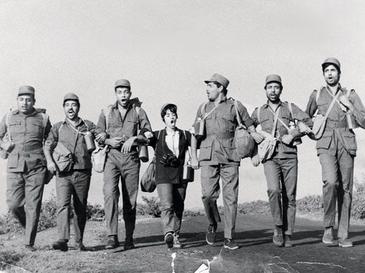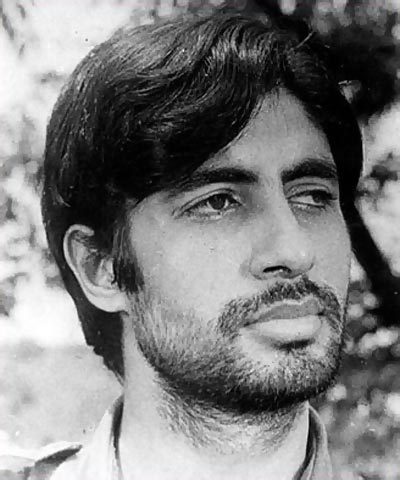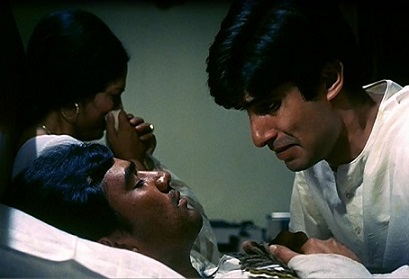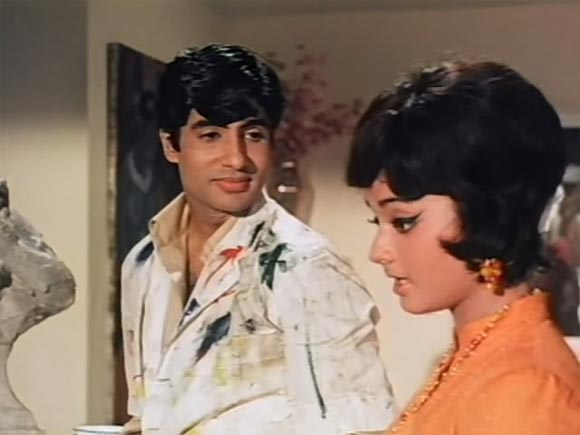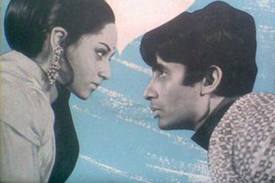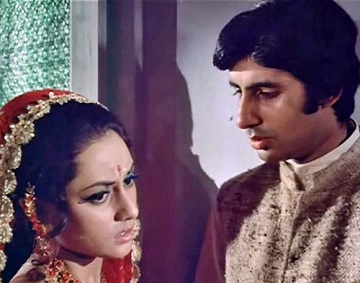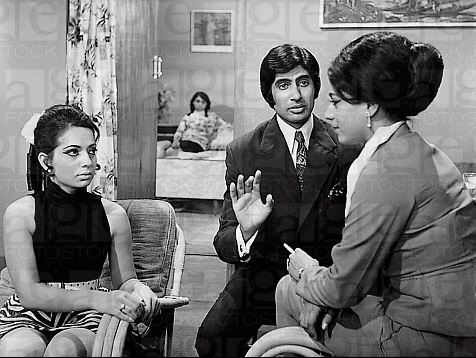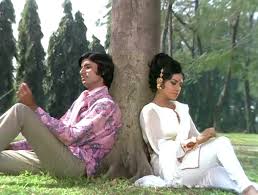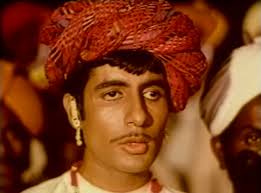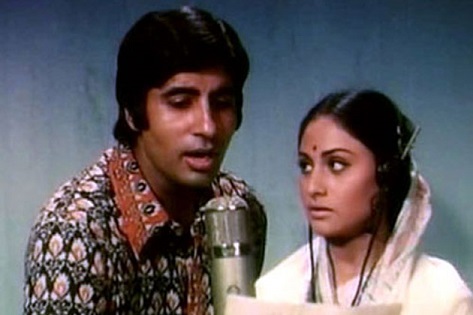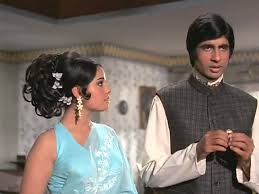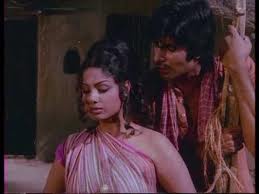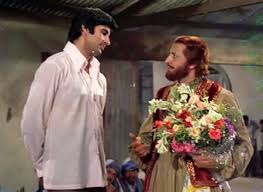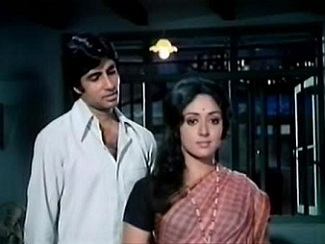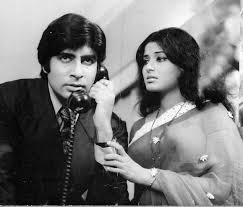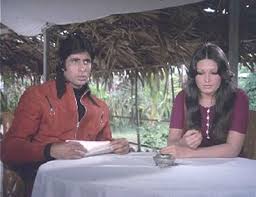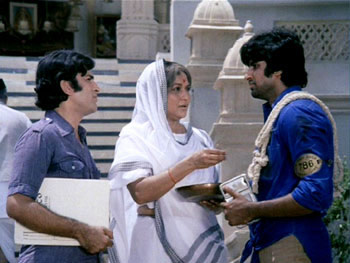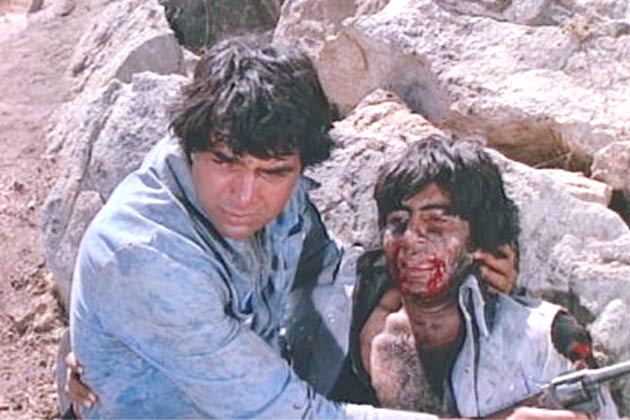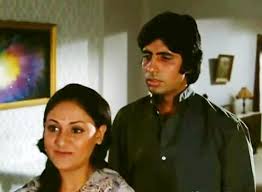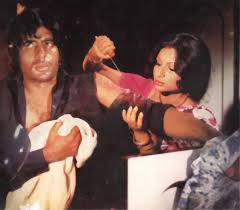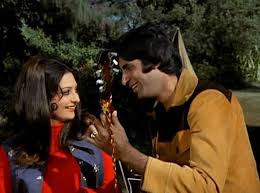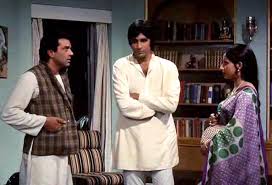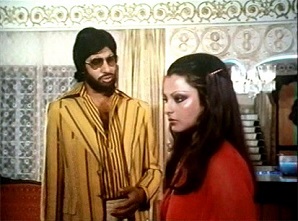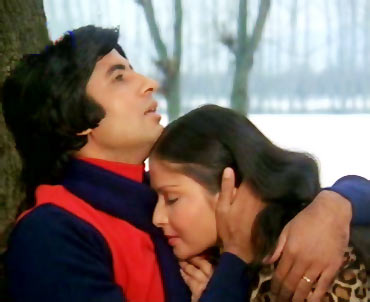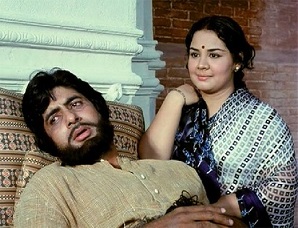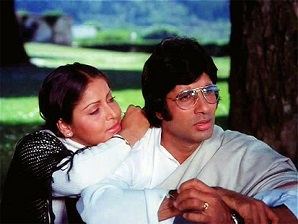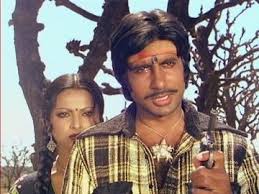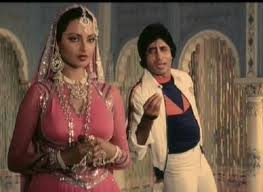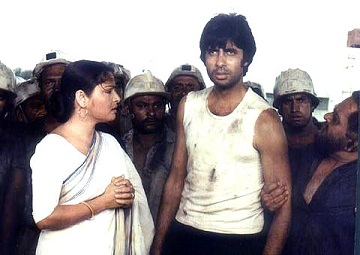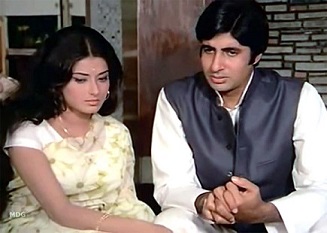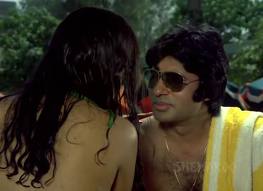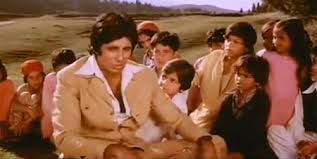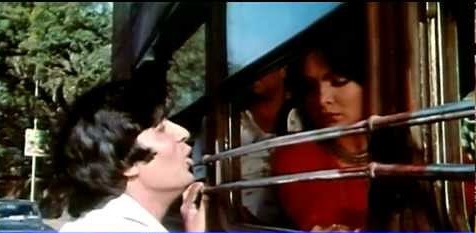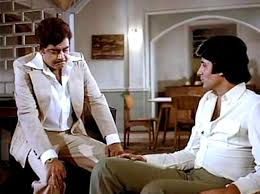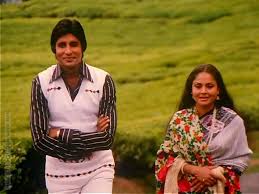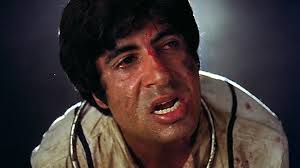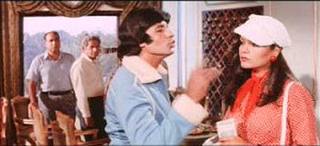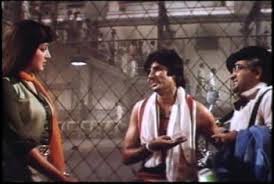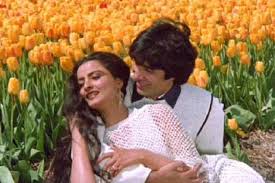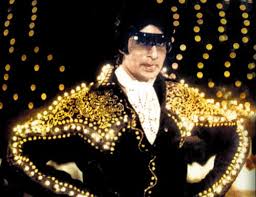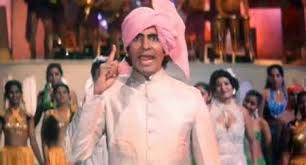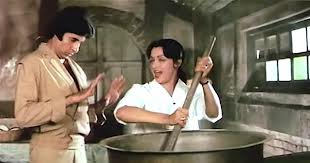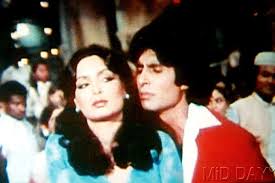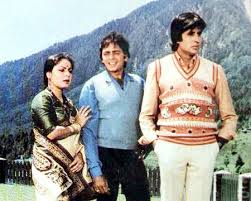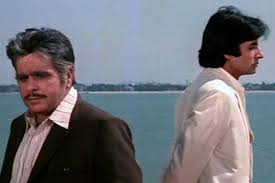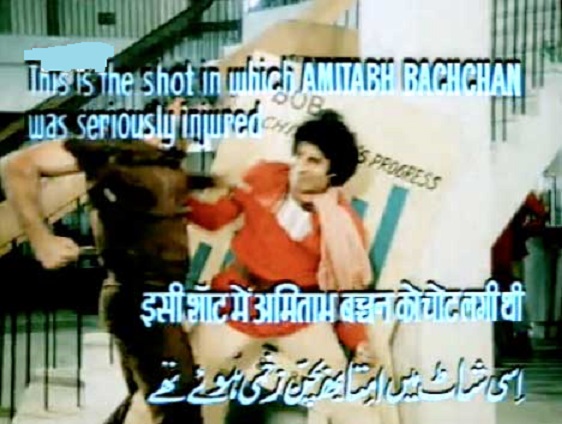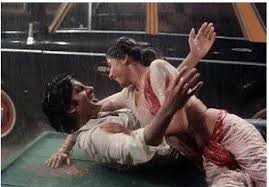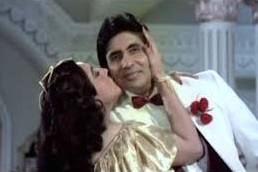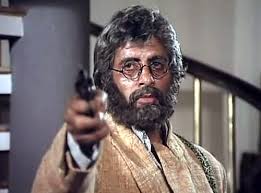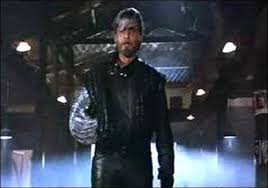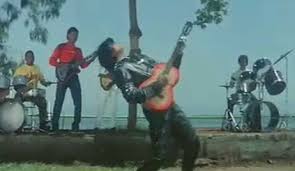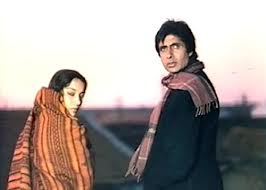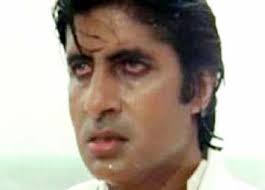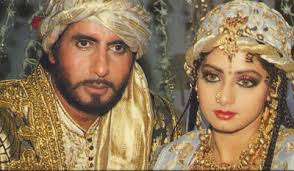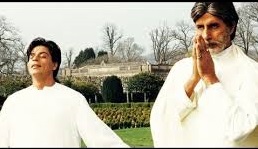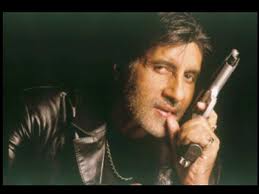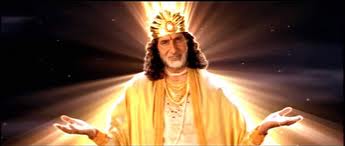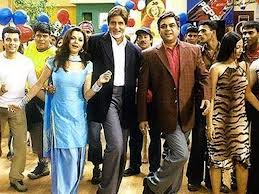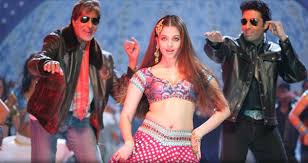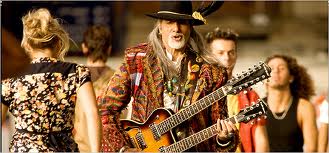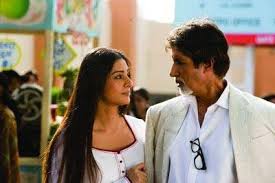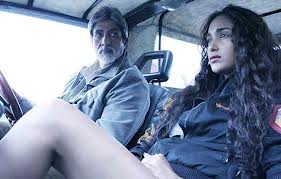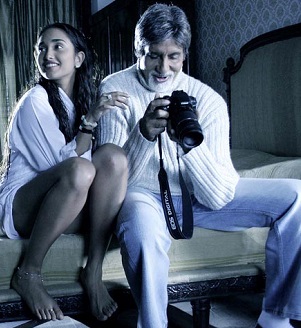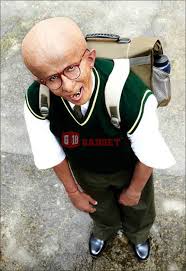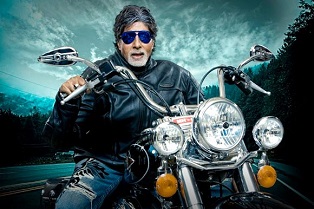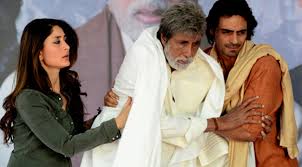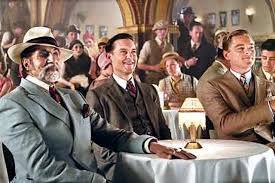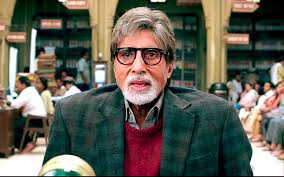Amitabh Bachchan
This is a collection of articles archived for the excellence of their
content. You can update or correct this page, and/ or send photographs to the Facebook page, Indpaedia.com. All information used will be duly acknowledged. |
The sources of this article include
Sweet 60! A factfile Sukanya Verma/ Rediff
Rediff Rediff.com Hindustan Times Bollywood Life Filmy Quotes
Personal details
The person
Born on October 11, 1942 in Allahabad
Name: Given name: Amitabh Harivansh Srivastav He was to be named Inquilab before his father finally agreed upon Amitabh, which means brilliance unlimited. He is called Big B by the media, Munna by his parents and Amit by his close friends. Amitabh's favourite director Hrishikesh Mukherjee refers to the superstar as Maharaj. His favourite screen name is Vijay ( Deewar, Zanjeer, Shakti, Agneepath),
School: He attended Sherwood School, Nainital and graduated with a B Sc from Kirorimal College, Delhi.
Height: 6-feet, 2-inch
The Big B is ambidextrous -- he can write with both hands. He excelled at science subjects, but fared abysmally in languages.
He is very particular about being neat and orderly. Even as a struggling actor, his two-room apartment was scrupulously clean.
Known for his sharp memory, AB never forgets the birthday or special occasions in his loved one's lives. The actor makes it a point to wish them unfailingly.
Amitabh is a punctuality freak. In an industry, where most stars have little respect for time, the gracious actor is known to always report on time
Family
Mr Bachchan's grandfather (presumably, maternal) was from Karachi and Amitabh had visited that place for the first time with his mother when he was 2 years old
He regards his younger brother Ajitabh as his best friend.
Amitabh makes it a point to have at least one meal with his family. He likes his meals to be served to him by Jaya.
According to Amitabh, his kids (Shweta and Abhishek) are his severest critics, who run down everything -- from his clothes, hair, performance to dancing -- every time his film is released.
Both Bachchan's children have found their matches in the first family of show business, the Kapoors. Shweta married Raj Kapoor's eldest child Ritu's son Nikhil Nanda. Abhishek lost his heart to RK's eldest son Randhir's daughter Karisma.
Jaya has compiled her 60th birthday gift to Amitabh: a 400-page coffee table book replete with 800 photographs called To Be or Not To Be, written by Khalid Mohamed. Abhishek and Shweta have each contributed a chapter to the book.
He also never leaves his home without touching his parents' feet.
The god-fearing Libran reads the holy Bhagwad Gita regularly.
His biography in a nutshell
Amitabh Bachchan was born on 11 October, 1942, in Allahabad in the state of Uttar Pradesh in Northern India, the son of Indian poet Dr Harivansh Rai Bachchan. He was initially named Inquilab, inspired by the slogan used during the struggle for Indian independence, 'Iquilab Zindabad', but was re-named Amitabh, meaning 'the light that would never go off'. His mother Teji, a Sikh, had a keen interest in theatre and was also offered acting roles but chose domestic duties instead.
Amitabh, the eldest son - the younger being Ajitabh - studied at Allahabad's Jnana Prabodhini and Boys' High School, followed by Nainital's Sherwood College, where he majored in art. He then went on to study at Kirori Mal College in Delhi where he completed his degree as a Bachelor of Science and also obtained an MA. He started a job as a freight broker in Calcutta, but soon gave this up to pursue a film career.
His first film, Saath Hindustani (Seven Indians), released in 1969, was not a success, even though he received a National Film Award for Best Newcomer. This was followed by Anand. He went on to act in several other less successful films and also made a guest appearance in Guddi, which starred his future wife Jaya Bhaduri, and he also narrated Hrishikesh Mukherjee's Bawaarchi, again starring his future wife as well as Rajesh Khanna. He then appeared in Bombay to Goa with Aruna Irani and the comedian Mehmood. In 1974 he starred in Roti Kapda Aur Makaan (Food House and Clothing). Directed by Manoj Kumar, the film addressed honesty in the face of oppression and financial hardship. The film was a commercial success. But it was the later films which enabled Bachchan to consolidate his position in the industry.
In 1982 he suffered a potentially fatal intestinal injury during the filming of a fight scene in Manmohan Desai's Coolie, in which he was performing his own stunts. He was close to death and was in hospital for several months, during which time members of the public gathered outside the hospital to pray for him. In response to the huge publicity that the film received at the time, the director decided to change the ending as the original had the hero, played by Bachchan, dying. The film was eventually released in 1983.
Later Amitabh was diagnosed with myasthenia gravis, which made him feel weak mentally and physically. He decided to retire from films and join politics and support his long-time friend, the late Rajiv Gandhi, elder son of Mrs Indira Gandhi and the grandson of Pandit Jawaharlal Nehru. However, this was short-lived and in 1987, he resigned after a scandal after a newspaper mentioned his name in connection with the 'Bofors Scandal'2. As a consequence there was legal action and his name was eventually cleared.
In 1988 the superstar returned to acting and went on to set up his own company, ABCL.
Harishvansh replies to an angry Amitabh
Life lessons by Harishvansh Rai to an angry Amitabh
The Times of India TNN | Apr 10, 2015, 06.00 AM IST
"Why was I born?" a young Amitabh Bachchan once angrily asked his father [during his College days]. The latter's reaction is something the Big B still carries with him. The following are his words:
The avenues and opportunities open to the youth today in an economically liberated India were absent in the late 50s and early 60s. After graduation what? Where to find a job? What job? How? When? And the idealism and debate and the coffee-house banter soon converts into anger. The anger of not knowing what to do with ourselves.
You look for answers. You turn to those that may have them. And in one 'enlightened' moment you get the answer from a fellow sufferer. "Why were we brought into this world? To suffer." That's it! We should never have been brought into this world. Judgment passed.
Angered, frustrated, strengthened and armed with unreasonable thought, I walked into my father's study one evening and for the first time in my life, with choked emotion, raised my voice at him and screamed: "Aapne hamme paida kyun kiya?"("Why did you give birth to me?")
My father, immersed as he always was in his writing, looked up at me with some initial surprise and then settled down to a more understanding posture and remained so for almost eternity. No one spoke. Not him. Not me. Not a sound. Just the measured clicking of the timepiece on his desk — and my unmeasured breathing!
When nothing came across from the parent quarter, I turned and left. It was an uncomfortable night for me. The next morning my father walked into my room, woke me up and handed me a sheet of paper and left. I opened it. It was a poem he had written overnight — titled "Nayi Leek" or "The New Generation":
Zindagi aur zamane ki kashmakash se
Ghabrakar mere ladke mujhse poochhte hain
'Hamme paida kyun kiya tha?'
Aur mere paas iske siwa
Koi jawab nahin hai
Ki mere baap ne bhi mujhse bina pooche
Mujhe paida kiya tha' ' Aur mere baap se bina pooche unke baap ne, unhe,
Aur mere baba se bina pooche unke baap ne, unhe...
Zindagi aur zamane ki kashmakash
Pahle bhi thi ab bhi hai, shayad zyada,
Aage bhi hogi, shayad aur zyada.
Tumhi nayi leek dharana,
Apne beton se poochhkar unhe paida karna!
("Pulled and torn by the strains of life and living / My sons ask me / 'Why did you give birth to us?' / And I do not possess an answer to this / That even my father did not ask me before giving birth to me, / Nor my father was asked by his father / Nor my grandfather was asked by his father before being brought. / The trials and tribulations of life and living / Were there before / And are there now too, perhaps more / And shall be there tomorrow, even greater. / Why don't you make a new beginning, a new thinking? / Ask your sons before giving birth to them!")
There are no excuses in life and no blame. Every morning is a fresh challenge. Either you learn to pick up the gauntlet and fight or learn to surrender to it.
So long as there is life, there is struggle! "Jab tak jeevan hai, tab tak sanghursh hai," said my father, as he lay weak and almost comatose in his bed in Prateeksha.
The room is now adorned by his large framed photograph, exactly where he breathed his last. I dress his portrait with a garland of fresh flowers every day and a diya burns perpetually underneath. A few months ago, he was joined on the side by my mother's portrait.
Every day and every moment that I pass the room as I climb the staircase to my bedroom or down from it, I stop by the door and look at both of them. And ask for strength.
It is the light of his wisdom that I endeavour to carry each day when I step out!
(Published in Soul Curry: Inspirational Stories To Touch And Heal Your Heart, 2010 )
Career prior to cinema
During his school days, Amitabh dreamt of becoming an engineer. At one point, he even contemplated joining the Indian Air Force.
His first job was with Shaw Wallace. He also worked as a freight broker for a shipping firm, Bird and Co, drawing a four-figure salary, [which was the highest that a career executive could aspire to begin with in those days] in Kolkata. (The gossip section of India’s biggest selling daily put Bachchan among ‘rags to riches’ cases. On the contrary, along with Kabir Bedi no first generation actor has come from a more posh upper-middle-class background.)
AB was rejected when he auditioned for a newsreader's job at All India Radio. Ironically, it is his voice that has been considered one of his strongest assets. (Details elsewhere on this page.)
The late 1960s: 'failed' radio announcer
When Ameen Sayani shattered Big B's dream of becoming RJ
Very few are aware that megastar Amitabh Bachchan had nurtured a dream of becoming a radio presenter before trying his luck in Bollywood and even visited Mumbai studio Of All India Radio for auditions.
The versatile radio announcer Ameen Sayani, who is back on Radio with his new show 'Sitaron ki Jawaniyaan', has revealed that he did not have time to meet him as the actor had not taken an appointment for a voice audition.
"It was somewhere in late 60s when I used to do 20 shows a week, spending most of the day locked up in the sound studio as I was involved in the every process of radio programming. One day, a young man named Amitabh Bachchan walked in without appointment for a voice audition.
"I had not a second to spare for this thin man. He waited and left and came back a few more times. But I could not see him and kept telling him through my receptionist to take an appointment and come," Sayani told in an interview.
Sayani, 81 in 2014, got to know later that it was the 'Sholay' star who used to come to his office for the auditions.
When Sayani watched 'Anand' (1971), where Bachchan starred opposite Rajesh Khanna at a trial show, he was bowled over by the persona and voice of Big B without knowing he was the same person who had come for the audition.
"Bachchan had come as chief guest for an award function and he spoke about his struggling days when he had gone thrice to a radio station and was not even allowed to sit for an audition. I was shocked to hear that. Later, when I interviewed him we spoke about this at length and laughed on it," Sayani remembers.
Film career: struggle to superstardom
He once spent a few nights on a bench at Marine Drive, Mumbai, when he was a struggler trying to make it big in films.
The debut of Amitabh Bachchan went unnoticed in Khwaja Ahmed Abbas' serious shoestring-budget, B&W (by then Filmistan was well into the colour era) Saat Hindustani (1969). The film was a non-starter at the box office. Abbas was a respected, if not overly talented, man, so the film got reasonably good reviews—but even then hardly any cinemagoer was aware of its existence. It was resurrected somewhat after Bachchan’s good showing in his next film Anand. After he became a superstar it became known as his debut film. But it was so serious (and B&W) that people still did not actually see it.
Rajesh Khanna was the reigning superstar but Amitabh Bachchan more than held his own against him. The high-class but low budget Anand (1971/ dir: Hrishikesh Mukherjee) was a success because of Khanna. It was the year’s no.19 success in the Hindi-Urdu charts, which was very good for its budget. However, the entire educated filmgoing middle class wanted more of the tall Babu Moshai. Unfortunately, rave notices and middle-class admiration did not translate into A-list assignments for Bachchan. |
Hrishikesh Mukherjee's Anand was modelled on his friendship with Raj Kapoor, where Amitabh became Hrishida (Babu moshai) and Rajesh Khanna played the author-backed Anand Sehgal. The climax stays fresh in the actor's mind as he recalls, 'I was supposed to cry, The truth is I was -- in fact, both Rajesh and I were -- laughing hard! My chin was tickling his stomach. There's hardly any difference in the sound when one cries and laughs. Luckily, our faces were not seen -- it was a top angle shot. We were convulsing with laughter!'
He also got noticed in a small role as a speechless gunman in Sunil Dutt's commercially unsuccessful home production Reshma Aur Shera.
After his likeable act as the dry, curt but compassionate Babu moshai act in Anand, Amitabh had a spate of flops. Of his next twelve films (1971-73), eleven were flops, including Parwaana, Pyaar Ki Kahani, Reshma Aur Shera, Bombay Talkies, Bansi Birju, Ek Nazar, Raaste Ka Patthar, Sanjog, Garam Masala, Bandhe Haath.
Bombay to Goa (1972), a B-film, was the exception in this list. It was the no. 12 hit of the year, which was very good for its low budget.
While Shah Rukh Khan and Nana Patekar got critical acclaim playing negative roles in Darr, Baazigar and Agni Sakshi respectively, Amitabh played a villain much earlier in Parwana opposite Yogita Bali. More recently, he played the vicious Manu in Aks and the manic schizophrenic Vijay Singh Rajput to chilling effect.
Hrishikesh Mukherjee’s Abhimaan broke the jinx. Hrishikesh Mukherjee’s Abhimaan (1973) was Bachchan’s first lead role in an A-list (though medium-budget) film after a series of flops, low-budget films, supporting roles (Raaste Kaa Patthar, Reshma Aur Shera), bit roles (Piya Ka Ghar) and even the odd villainous role (Parwana). Abhimaan became an instant cult classic. Though it was the no. 14 hit of the year in commercial terms, that was phenomenal considering its budget. Bachchan was now a name to reckon with.
Hrishikesh Mukherjee’s Namak Haraam (1973) highlighted Bachchan’s growing power. Though pitted against the reigning superstar, on the strength of Anand and Abhimaan Bachchan was able to bag a role that was almost on a par with Khanna’s. Many preferred his performance to Rajesh Khanna’s.
Salim-Javed, India’s most successful screenwriters ever, gave Bachchan the ‘angry young man’ persona and image that he would embody till 1991. Zanjeer (1973) was a mega-success and the no.2 box office hit of the year(behind Bobby). However, continuous commercial success was still a while away. More serious, medium budget films followed.
Prakash Mehra's Zanjeer was first offered to Dev Anand, Raaj Kumar and Dharmendra. Amitabh was the final choice for the film that became the turning point in his career.
Deewaar (1975), also scripted by Salim-Javed, was a monster hit that established Bachchan as India’s highest paid star, a position he would retain till around 1993.
Despite commercial success, he continued to work for the respected maker of low-budget family films, Hrishikesh Mukherjee. Amitabh, a timid English professor who had to masquerade as the goofy botany professor Parimal Tripathi, was not the original choice for the role in Chupke Chupke. Director Hrishikesh Mukherjee was planning on taking a newcomer for the second lead. The leading couple was Dharmendra and Sharmila Tagore.
Dharmendra was India’s no. 1 star and Amitabh Bachchan merely on the way up when they signed up for Sholay (1975). However, by the time that India’s second 70mm film was released Bachchan was at the top, and Dharmendra had slipped down a rung. Sholay, another Salim-Javed script, cemented Bachchan’s position at the top.
Kabhi Kabhie (1976) was a major hit, though a serious film. It was the first ‘multi-starrer’ the star cast of which was headed by Bachchan, though it starred the likes of Shashi Kapoor, who was considerably his senior. Kapoor, who had just recovered from a lean patch, had wisely been accepting subordination since Deewaar: something Navin Nishchol foolishly rejected (and thus disappeared from Filmistan.)
Amar Akbar Anthony (1977) was the no.1 hit of the year. By now mega-success had becme a habit for Bachchan.
After 2000: Mature roles
Mohabbatein (2000) was Mr Bachchan’s first mature role. The nation had not had enough of the former superstar. So, instead of being relegated to ‘father roles’ (as most other actors are when they reach middle age, Bachchan became the first 60-year-old after Dilip Kumar to have roles written specially for him.
Three of them were Humbert Humbert-kind of roles. While Nishabd was an actual remake of Lolita, he romanced younger women in Cheeni Kum and Black
Bunty Aur Babli (2005), for instance. was a meandering film that dragged till Bachchan pere came along, shook a leg and steered the film to box office success.
Vignettes
His favourite screen profession was to play a cop ( Zanjeer, Ram Balram, Bade Miya Chote Miya, Aks ).
While shooting for Mukul Anand's Khuda Gawah, Najibullah, then the president of Afghanistan, provided Amitabh with half the country's air force for his protection. Khuda Gawah became one of the most watched Indian films in Afghanistan.
During the making of Khuda Gawah, Amitabh, who plays a Pathan, developed blisters on his face due to the constant application and removal of his fake beard.
A comicbook series about superhero Amitabh, based on the star was published in the mid-eighties. The story was later developed into a full-fledged film Toofan.
Holi and Amitabh Bachchan are synonymous with each other. Remember Amitabh's raunchy Rang barse in Yash Chopra's Silsila? The man loves Holi and loves to celebrate the festival of colours by throwing parties, at which half the film industry is invited.
BBC Online voted him Star of the Millennium, above Laurence Olivier, Charlie Chaplin and Marlon Brando.
He made a path-breaking entry into Indian television with Kaun Banega Crorepati the Hindi version of Who Wants To Be A Millionaire?, . The show was an astounding success and marked another glorious chapter in his career.
He is the only Asian to feature on BBC's much loved Wogan Show.
He has a wax replica displayed at Madame Tussauds in London.
At 58, AB jumped from a height of 30 feet, along with costar Manoj Bajpai for Aks. The actor's wicked performance of a possessed cop was well received, though the film was a no show at the BO.
In a career spanning over three decades, AB also acted in a mythological drama. It was a special appearance as the bearded Lord Indra in Arjun Sajnani's Agni Varsha. Sajnani and Bachchan go back a long way to their Delhi theatre days.
Female friends
Maya
Celebrity biographer Hanif Zaveri ,,, shared that [Amitabh Bachchan’s] love story with a woman named Maya started back when he was working in Calcutta (now Kolkata), and earned around Rs 250-300 per month. “She was working at British Airways at the time. Amitabh Bachchan really loved her, and she did too,” Hanif shared. He added that after his Kolkata job, Amitabh moved to Mumbai to find work in the movies …
At this time, Amitabh was working on his debut film Saat Hindustani, where he was sharing the screen with Mehmood’s brother Anwar Ali. “He told Anwar about his worries and Anwar understood his concerns. So Anwar gave him a place to stay at his house,” he shared and added that Anwar had gotten an apartment from Mehmood, and Amitabh stayed in this house for a while.
“He and Maya were together for a while and perhaps, they could have gotten married also but Amitabh wasn’t stable in his career at the time,” he said and added, “In those days, Amitabh was a very shy man and Maya was quite cunning. Sometimes, she wouldn’t even bother who was sitting with him and would speak with him as she wanted, she would scold him too. Anwar Ali, and all of Amitabh’s other friends didn’t really like this. And Amitabh was also getting nervous about this.”
Hanif recalled Anwar talking to him about his and shared, “He told me that when they were shooting in Goa for Saat Hindustani, he told Amitabh to break up with Maya. He felt that she wouldn’t fit into Bachchan’s family and if Amitabh was to go ahead in the movies, problems might increase. And Amitabh also felt that there was something missing. Eventually, he started distancing himself from Maya and they broke up, and went their separate ways.”
Wife Jaya Bhaduri
Amitabh Bachchan and Jaya Bhaduri met for the first time at the Film and Television Institute of India, Pune, and then again on the sets of Hrishikesh Mukherji's Guddi.
Amitabh would have been the hero of his real-life heroine Jaya's debut film, Guddi, as he was the original choice for the lead role. Finally, Samit Banja bagged the role.
Being the conservative gentleman that he is, Amitabh never formally dated Jaya. They always went out in groups.
It was during the making of Sholay that Amitabh discovered he was going to be a father of his firstborn, Shwetambiri. Amitabh's role of the strong, silent Jai was first offered to Shatrughan Sinha who refused to play second fiddle to Dharmendra.
Amitabh vs. Jaya vs. Rekha, Jaya vs. Aishwarya
There was a time when Amar Singh and Amitabh Bachchan used to share a very close bond. However, due to some personal and political differences between Amar Singh and Jaya Bachchan, the two decided to sever all ties with each other. Amar Singh, who has often commented on the Bachchan family post their fallout has once again made a shocking statement against Amitabh and Jaya's relationship.
The former SP leader said, "People blame me for every possible rift in the country. When the Ambanis split, they projected me as the person who created the Mahabharat between them. It wasn't me. People have said the same about me and the Bachchans. But even before I met Amitabh Bachchan, he and Jaya Bachchan were living separately. One of them was living in 'Pratiksha' and the other lives in his other bungalow 'Janak'. There were also speculations about a problem between Aishwarya Rai Bachchan and Jaya. I am not responsible for that."
Not long before, Amar Singh had claimed that it was Amitabh Bachchan’s decision to not stay friends with him. He also said that it was Amitabh Bachchan who warned him not to accept Jaya Bachchan in his political party because of her “inconsistent nature and habits”. (BCCL)
Amitabh and Jaya's romance dates back to the early 70s, and they have been married for over four decades. Jaya was impressed by him in their very first meeting and it was almost a case of love at first sight. Amitabh wrote in his blog that they both were planning a trip to London to celebrate the success of his film, Zanjeer, but his father would have none of it. "My father came down heavily on me - 'If you are planning a holiday with this girl, you will have to marry her and go, else your decision is denied.' I was an obedient child! I got married the very next day in a quickly organized wedding with family and some dear friends, without any fanfare, and left for the holiday that very night," he wrote.
But rumours of trouble in Amitabh and Jaya's paradise cropped up soon. Amitabh started shooting for Do Anjaane (1976) with Rekha and stories of their torrid affair spread like wildfire. The two reportedly had clandestine meetings at a friend's house and rumours of a secret marriage gained momentum. To add fuel to the fire, Rekha attended Rishi and Neetu Kapoor's wedding with sindoor. Yash Chopra's Silsila, where Jaya played Amitabh's wife and Rekha played the 'other woman', was believed to be a reflection of the trio's real life.
Rekha's biography quotes Jaya Bachchan saying in an interview, "Let the whole world say what they want. He [Amitabh Bachchan] has made a commitment to me and he has to have the courage (to say he's in love with somebody else!), and if he is doing something behind my back, it's his problem. Not my problem. He has to live with it. And with his conscience!"
Rekha's is quoted as telling Stardust, "Jaya did not mind the relationship as long as she thought her husband was only having a fling. It's when she realized that he was really emotionally involved, that is when it began hurting her. She called me for dinner one evening and though we spoke about everything but him, before I left that day, she made sure to tell me, 'I will never leave Amit whatever happens'." Amitabh also said in an interview that a divorce was out of the question.
Rekha reacted to Amitabh's denial of the affair in an interview with Filmfare, "He did it to protect his image, to protect his family, his children... I love him, he loves me - that's it! I don't care what anybody thinks... So why should I care about what he's said in public?"
However, Amitabh stopped working with Rekha. Throughout the controversy, the Bachchans did not indulge in any mudslinging and kept their poise in public. Jaya said on Rendezvous With Simi Garewal that she never questions her husband when his name comes up in gossip columns because she finds it "cheap". She said that she has always trusted him completely. Amitabh also said that he never feels the need to explain anything that is written about him because he finds it "demeaning" to clarify to his wife and just thanked his stars saying, "I'm very fortunate that Jaya is in the same profession. She understands what the media is all about and the various pitfalls and hazards that leading men and women go through."
In fact, the media did not spare Aishwarya Rai Bachchan either and rumours of a saas-bahu tiff with Jaya Bachchan filled up innumerable gossip columns. But the Bachchan bahu has always spoken fondly about Jaya and the two even shared a heartwarming moment at the recently [2016/ 17] held Stardust Awards.
Tastes
Amitabh dabbles in poetry once in a while. He also enjoys reciting his Babuji's (father) poems. His favourite is Madhushala.
He is a vegetarian who loves to gorge on Aloo Puri, Pakodas, Dhoklas and Parathas. AB loves Gulab Jamuns.
Amitabh has a penchant for wristwatches and sunglasses, and possesses an enviable collection of both. Bvlgari, Omega, Cartier, you name it, he has it.
Favourite co-stars
Besides making a hit pair with Jaya Bhaduri, Rekha, Zeenat Aman, Raakhee, Parveen Babi and Sridevi, Amitabh made a smashing pair with his heroes too. Witness Dharmendra ( Ram Balram, Sholay, Chupke Chupke ), Vinod Khanna ( Muqqadar Ka Sikandar, Amar Akbar Anthony, Parvarish ) and, most enduringly, Shashi Kapoor ( Kabhi Kabhie, Silsila, Deewar, Shaan, Trishul ).
Amitabh considers Waheeda Rehman one of the most beautiful women in the film industry.
Both times Amitabh worked opposite Rajesh Khanna (Anand, Namak Haram), he ended up winning the Filmfare Best Supporting Actor Trophy.
Antagonistic co-stars
Amitabh Bachchan and his tiffs with Bollywood celebs, The Times of India
It has not been an easy journey for the actor. On the way to success, he's also had some tiffs with his co-stars.
Amitabh Bachchan and Shatrughan Sinha were the top notch stars of the '80s. The duo has shared the frame in hit films like Kaala Patthar, Dostana and Shaan. However, the two apparently had ego tussles and never saw eye-to-eye. In an interview with Mumbai Mirror, Shatrughan Singh was quoted saying, "Jawaani thi, josh tha, there were ego issues." However in 2014, Big B and Sinha came together during Diwali, ending all issues. "I would say it was a Ram-Bharat milap. The Bachchan family invited us and we were treated as if we were the chief guests. All four of them, even Amitabh's daughter Shweta, welcomed us warmly and took good care of us," Sinha was quoted in the report.
Vinod Khanna was considered to be one of the biggest rivals of Amitabh Bachchan, back in the '70s and '80s. The two were considered as a threat to each other as both were rising stars at that time. In an interview with Bombay Times, Vinod Khanna had admitted that they were competitors, but not rivals. While Big B was making it big in Bollywood, Khanna moved on to politics. In a PTI report, Amitabh Bachchan was quoted saying, "Vinod Khanna and Shatrughan Sinha have entered politics and are doing well... I feel I have been left behind by my contemporaries."
Amitabh Bachchan and Rajesh Khanna created one of the most iconic scenes of Bollywood, in the film Anand. The then superstar was praised a lot for his portrayal of Anand and Big B too started off on a journey of hits. Reportedly, a lot was written at that time about Big B and Kaka's relationship, with rumours stating that Rajesh Khanna was insecure about Big B's popularity. However, a shining star, Rajesh Khanna, slowly faded away from Bollywood films, while Amitabh Bachchan continued to make it big.
Amitabh Bachchan has not just had tiffs with his co-stars and contemporaries, but with filmmakers too. According to a Mumbai Mirror report, Big B and Subhash Ghai had not been on talking terms for as long as 25 years, as their first project Devaa was scrapped owing to creative differences between the two. However in 2012, the Showman of Bollywood paid a visit to the angry young man and broke the ice. Amitabh Bachchan was then recovering from a major surgery and Subhash Ghai apparently was planning to work with him. He was quoted in the report as saying, "I went to meet him at his home with no hidden agenda, just to catch up with him and wish him a speedy recovery. It was long due. I am his admirer. I'd love to work with him. We need a great script. I consider him the best actor in the country, after Dilip Kumar."
It is a known fact that Amitabh Bachchan's son, Abhishek was engaged to Karisma Kapoor, but they did not end up tying the knot. However, according to a report on Mid-day.com, Abhishek then started refusing films opposite Karisma's younger sister Kareena, while Bebo snubbed Big B at an award function. The report further stated that things simmered down at Karan Johar's party in 2009, when the Bachchan bahu Aishwarya, and Kareena hit it off on a positive note. Abhishek and Kareena had made their debut together in Refugee.
Shah Rukh Khan is currently one of the reigning stars of Bollywood. However, he had to face some stiff competition from veteran actor Amitabh Bachchan. Big B has not only been very active and popular in Bollywood, but on the small screen as well. The actor was the face of TV reality show Kaun Banega Crorepati. However for the third season of the show, the makers roped in SRK as the host. While the show's ratings dropped, the next season saw the return of Amitabh Bachchan. While SRK and Big B have not been professional rivals, there was apparently a tense time between the two. On the big screen, the duo has done several films together.
Advertising
Ironically, the actor who refused to endorse any products at his peak is a regular fixture on the advertising circuit these days, lending his image and persona to a wide range of products from cellular phones to soft drinks to pens to cars to financial schemes. Recently, French perfume company Lomani launched a new fragrance, Amitabh B Pour Homme (for men) and Amitabh B Pour Femme (for women).
Politics
Amitabh won the Allahabad parliamentary seat in December 1984 on a Congres ticket, defeating veteran Hemwati Nandan Bahuguna. His stint in politics did not last long and he resigned from Parliament four years later after condeming it as a 'cesspool.'
ABCL
He was one of the judges at the Miss World beauty pageant in 1995. The next year his company Amitabh Bachchan Corporation Limited organised the Miss World contest in Bangalore, India. Unfortunately the event met with flak from feminist groups who felt the contest was 'demeaning to Indian culture.'
2023: Gifts iconic bungalow 'Prateeksha' to daughter Shweta Nanda
[https://timesofindia.indiatimes.com/videos/etimes/bollywood/amitabh-bachchan-gifts-his-rs-50-crore-iconic-juhu-bungalow-prateeksha-to-daughter-shweta-nanda-reports/videoshow/105489193.cms Amitabh Bachchan gifts his Rs 50 crore iconic Juhu bungalow 'Prateeksha' to daughter Shweta Nanda Reports/ etimes.in/ India Times- The Times of India/ Nov 25, 2023]
Amitabh Bachchan has gifted his iconic Juhu bungalow, Prateeksha, to his beloved daughter Shweta Nanda. Yes. According to reports, the transfer of ownership was formalized through two distinct gift deeds, with each deed corresponding to a specific plot on which the bungalow stands. A gift deed for the property was executed on November 8 and the stamp duty of Rs 50.65 lakh was paid for the transaction. Speaking about the property, Prateeksha is located in one of the most posh areas of Mumbai. The bungalow, whose market value is listed at over Rs 50.63 crore, stands tall amidst lush greenery, offering breathtaking views, and holds immense sentimental value for the Bachchan clan.
It was the veteran actor's first property in Mumbai. Big B spent his early years in Bollywood in this bungalow with his parents, Harivansh Rai Bachchan and Teji Bachchan. Needless to say, Prateeksha became witness to countless memories and milestones as the legendary star carved his path to stardom. With this heartfelt gesture of gifting Prateeksha to Shweta Nanda, the 'Pink' actor not only passed on a physical asset but also symbolized the deep emotional connection the father-daughter duo shares. Apart from Prateeksha, the Bachchan family owns several other properties in Mumbai including Jalsa and Janak in Juhu
Memorable punchlines and dialogues
Aakhree Raasta 'Wahan se tumhe yeh chheh dikh raha hoga. Lekin yahan se mujhe yeh nau dikhta hai. Yeh farq is liye hai kyonki tum isse apni jagah se dekh rahe ho aur main apni. Hum dono apni apni jagah sahi hain. Bas humare dekhne ka nazariya alag alag hai. Hum dono ki beech mein yeh farq saari zindagi bana rahega. Isliye tum wohi karo jo tum apna farz samajhte ho. Aur main wahi karoonga jo main apna dharam samajhta hoon. Agar main jeeta toh tumhe apne pitah pe garv hoga. Lekin kahin agar tum jeet gaye toh mujhe bhi apne bete pe garv hoga lekin meri aatma ko shanti nahi milegi.'
Adaalat: Ek rahen eer, ek rahen beer, ek rahen phatte aur ek rahen hum. -
Agneepath: Pagar badao... pandrah sau rupiye me ghar nahin chalta, saala imaan kya chalega? -
Agneepath 'Vijay Dinanath Chauhan; poora naam, baap ka naam Dinanth Chauhan, maa ka naam Suhasini Chauhan, gaon Mandwa, umar chhattis saal, nau mahina, aath din, yeh solvaan ghanta chal rahela hai... haain?'
Agneepath: Yeh telephone bhi ajeeb cheez hai — aadmi sochta kuch hai, bolta kuch hai aur karta kuch hai. -
Agneepath: Is duniya mein tarakki karne ke liye ... na bolna bahut zaroori hai
Agneepath: bandooq bhi dhikhata hai aur piche bhi hat-ta hai
Agneepath: Eh Kaancha, saala bandook bhi dikhata hai aur peeche bhi hat ta hai? -
Agneepath: Sawaal jis zabaan mein kiya jaye ... jawaab us hi zabaan mein dena chahiye
Amar Akbar Anthony: Ek phool de dona maa, wahan ees ke mafak koi kadak afsar mil gaya to usko hum yeh phool deke apun ka baap bana denga.
Amar Akbar Anthony: Aisa to aadmi life mein doich time bhaagta hai. Olympic ka race ho, yaa Police ka case ho. Tum kis liye bhaagta hai bhai?
Anand (1971) : Anand mara nahi, Anand marte nahi.
Baghban: Ek baap agar apne bete ki zindagi ka pehla kadam uthane mein uski madad kar sakta hai ... toh wahi beta apne baap ke aakhri kadam uthane mein usse sahara kyun nahi de sakta?
Baghban: Tum ho toh hum hain ... hum hain toh sab kuch hai ... warna kuch nahin, kuch bhi nahin
Bbuddah Hoga Tera Baap: Abey buddah hoga tera baap -
Chupke Chupke: 'Gobhi ka phool, phool hokar bhi phool nahi, sabzi hai. Isi tarah gende ka phool phool hokar phool nahi hai'.
Coolie: 'Bachpan se hai Allah ka haath aur Allah rakha hai apne saath. Baazu pe hai saat sau chiyasi ka billa, bees number ki beedi peeta hoon, kaam karta hoon coolie ka aur naam hai Iqbal. Jiske sar pe haath pade bache na uska ek bhi baal.'
Coolie: Tere haath mein maut ka samaan hai toh ... mere seene pe khuda ka naam hai
Deewaar: Aaj mere paas bangla hai, gaadi hai, bank balance hai, kya hai tumhare paas? -
Deewaar: Jao pehle us aadmi ka sign le ke aao jisne mera baap ko chor kaha tha; pehle us aadmi ka sign le ke aao jisne meri maa ko gali deke naukri se nikal diya tha; pehle us aadmi ka sign le ke aao jisne mere haath pe ye likh diya tha..ye.. Uske BAAD, uske baad, mere bhai, tum jahan kahoge main wahan sign kar doonga. -
Deewaar: 'Main aaj bhi phenke hue paise nahin uthata'.
Deewaar: Peter, tum log mujhe wahan dhoond rahe the aur main tumhara yahan intezaar kar raha hun -
Deewaar: Sapne bhi samundar ki lahron ki tarah haqeeqat ki chattanon se takrakar toot jaate hain.
Deewaar: Uff tumhaare usool, tumhaare adarsh. Kis kaam ke hai tumhaare usool. Tumhaare saare usoolon ko goond kae ek waqt ki roti nahin banaai jaa sakti, Ravi -
Department: Meri history janta nahi hai tu, mere shareer me haddi kam taanke zyada hain. –
Don: 'Don ka intezar toh gyaarah mulkon ki police kar rahi hai. Lekin Soniya, ek baat samajhlo Don ko pakadna mushkil hi nahi, namumkin hai'.
Don: Yeh tum janti ho ki yeh revolver khali hai ... main janta hoon ki yeh revolver khali hai ... lekin police nahin janti ki yeh revolver khali hai
Hum: 'Is duniya mein do tarah ka keeda hote hai. Ek woh jo kachre se uthta hai. Aur doosra woh jo paap ki gandegi se uthta hai. Kachre wala keeda insaan ko bimaar kar deta hai. Magar paap ki gandegi ka keeda saare samaaj ko bimaar kar deta hai. Kachre ke keede ko maarne ke liye flit bazaar mein milta hai. Magar paap ke keede ko marne wala flit, saala, bana hi nahi hai aaj tak.'
Kaala Patthar: Pain is my destiny and I can’t avoid it -
Kaala Patthar: Yeh koyle ki kaan ek azgar hai seth sahab, jo roz, anginath logon ko nigalkar, usei peeskar, jism se khoon ka ek-ek katra choos kar, ek laash ke roop mein ugal deta hai. -
Kaalia: Aap ne jail ki deewaron aur zanjeeron ka loha dekha hai, jailer sahab, Kaalia ki himmat ka faulaad nahi dekha. -
Kaalia: 'Hum bhi woh hai jo kabhi kisi ke peeche khade nahi hote. Jahan khade ho jaate hain, line wahin se shuru hoti hai'.
Kaalia: Hum jahan khade ho jaate hain, line wahi se shuru hoti hain. -
Kaalia: Kallu se Kaalia ka safar shuru. -
Kabhi Kabhie: 'Badi himmat chahiye, Vijay Sahab, bada hausla chahiye iske liye. Daag daaman pe nahi dil pe liya hai maine'.
Kabhi Kabhie: Kabhi kabhi mere dil mein khayal aata hai – ki zindagi teri zulfon ki narm chhaon main guzarne padti to shadab ho bhi sakti thi. -
Laawaris: 'Agar apni maa ka doodh piya hai to saamne aa. -
Laawaris: Apun woh kutte ki dum hai, jo baara baras nalli ke andar daal ke, nalli tedi hoti, apun seedha nahin hota! -
Major Saab: Don’t mess with the army. -
Mard: 'Jo mard hota hai usse dard nahi hota.'
Mohabbatein : 'Parampara, Pratishtha, Anushasan. Yeh iss gurukul ke teen stambh hai. Yeh woh aadarsh hain jinse hum aapka aane waala kal banaate hain'.
Mohabbatein: Is Imaarat ki neev itni majboot hai ke koi Raj Aryan haathon me violin aur chehre pe muskaan liye uski ek bhi eenth hilane ke liye kadam nahi rakh sakta —
Mr Natwarlal: 'Arre yeh jeena bhi koi jeena hai, Lallu?'
Muqaddar Ka Sikandar (1978) 'Sikandar kabhi kanoon ko apne haath mein nahi leta. Aur waise bhi main isse yahan nahi maarne wala tha. Yeh mera ilaaka hai. maar khaane ke baad yeh mujhe badnaam karta ke Sikandar ne apne mohalle mein bulake peet daala. Nahi isse toh main iske ghar mein hi jaakar maroonga'.
Muqaddar Ka Sikander: Aur waise hi, main is ko yahan nahi maroonga, warna log kahenge Sikandar ne apne ilake me usey mara. -
Muqaddar Ka Sikander: Zindagi mein log mohabbat ke sahare jeete hai ... main aapki nafrat ke sahare jeeonga
Namak Halal: 'Lo kallo baat. Arre babuji, aisi English aave that I can leave angrez behind. You see sir, I can walk English. I can talk English. I can laugh English. Because English is a very phunny language. Bhairon becomes Baron and Baron becomes Bhairon because their minds are very narrow.'
Namak Haraam: Hai kisi maa ke laal me himmat, jo mere saamne aaye? -
Sarkar: Mujhe jo sahi lagta hai main karta hoon, phir chahe wo bhagwan ke khilaaf ho, kanoon ke khilaf ho ya pure system ke khilaaf. –
Sarkar Raj: Apni sharto par chalne wale ko keemat chukani padati hai, mujhe jo sahi lagta hai wo mai karta hu -
Satte Pe Satta: 'Chain quli ki main quli ki chain.'
Satte Pe Satta: Daaru peene se liver kharab ho jaata hai. -
Shahenshah: 'Rishte mein toh hum tumhare baap hote hain, naam hai Shahenshah.'
Shakti: 'Koi sawaal nahi chahiye. Akela jee sakta hoon toh akela mar bhi sakta hoon. Meri maa ko maar diya usne. Yeh wohi aadmi hai jisne meri maa...Yeh toh hona hi tha ek na ek din yeh toh hona hi tha lekin ab sab khatm ho gaya. Bahut koshish ki apne dil se aapki mohabbat nikal doon lekin mein hamesha aapse pyaar karta raha. Chaha kin a karoon lekin aisa kyun, kyun aisa?
Shakti: Bahut koshish ki apne dil se aapki mohabbat nikal doon lekin mein hamesha aapse pyaar karta raha. Chaha ki na karoon lekin aisa kyun, kyun aisa? -
Shakti: Hamare desh mein kaam dhoondna bhi ek kaam hai -
Shakti: Narang saab, yeh kaam koi bhi insaan akele kar sakta tha, basharte ki use bhi meri hi tarah yeh pata hona chahiye ke woh is duniya mein akela aaya hai aur akela hi jaayega, isliye agar usey kuch karna hai toh woh bhi akele hi karna hoga. -
Sharaabi: 'Moochein ho toh Nathulal ji jaisi ho warna na ho.'
Sharaabi: Aaj itni bhi mai sir nahi maikhane mein ... jitni hum chhod diya karte the paimane mein
Sharaabi: Do aansoo is aankh se gire, phir do us aankh se. Phir do is aankh se, do us aankh se. Phir do is aankh se, do us aankh se. Kitne huye?...Nau lakh ke haar ke liye, barah lakh ke aansoo? Daddy hote to kehte: Vijay, tumhe business karna nahi aata? -
Sharaabi: Govardhan seth, samundar mein tairne waale kuoon aur taalabon mein dubki nahin lagaya karte hain. -
Sharaabi: Jigar ka dard upar se nahin maloom hota hai -
Sharaabi: Zindagi ka tambu teen bambuo pe khada hai.
Sholay Ghadi Ghadi drama karta hai, saala -
Sholay: 'Tumhara naam kya hai, Basanti?'
Sholay: Angrezon ke zamaane ke jailor, aur itni ghabrahat?
Sholay: Auron ko to inhone ek ghante mein sikha diya hai. -
Sholay: Hum bhi to roz khatron se khelte hai.
Sholay: Jo kal hua, woh dobara nahi hoga. -
Sholay: Kya karun, mera to dil hi kuch aisa hai, Mausi
Sholay: Mujhe toh sab police waalon ki suratein ek jaisi lagti hai
Sholay: Partner, ab bol hi diye ho to dekh lenge. -
Sisila Main aur meri tanhayi, aksar yeh baatein karte hai ... tum hoti toh kaisa hota ... tum yeh kehti, tum woh kehti, tum is baat pe hairaan hoti, tum us baat pe kitni hasti ... tum hoti toh aaisa hota, tum hoti toh waisa hota ... main aur meri tanhayi, aksar yeh baatein karte hai '.
Sooryavansham: Sooryavansh ek aag hai jisme doston ke liye jitni jyoti hai, dushmanon ke liye utni hi jwala. Bhoon dalo is kambaqt ko.
Teen Patti: Paisa kya hai, sirf ek number na.
Trishul – Sahi baat ko sahi waqt pe kiya jaye to uska maza hi kuch aur hai, aur main sahi waqt ka intezaar karta hoon
Trishul: Jisne pachchees saal se apni maa ko thoda thoda marte dekha ho, use maut se kya darr -
Trishul: Aaj aap ke paas aap ki saari daulat sahi, sab kuch sahi, lekin maine aap se bada garib aaj tak nahin dekha. Good bye, Mr R K Gupta. -
Trishul: Sahi baat ko sahi waqt pe kiya jaye to uska maza hi kuch aur hai, aur main sahi waqt ka intezaar karta hoon. -
Trishul: You are right, Mr R K Gupta, yeh contract mujhi ko milegi. Aur haan, mere banaye hue colony mein agar aapko ghar chahiye, to taqalluf mat kijiyega, makaan aap ko mil jayega. -
Yaarana: 'Kacha papad, pakka papad'.
Zanjeer: Jab tak baithne ko na kaha jaaye sharafat se khade raho. Yeh police station hai tumhare baap ka ghar nahi'./ Yeh tumhare baap ka ghar nahin, police station hai, is liye seedhi tahrah khade raho
His films
This section needs your help to cover all his great films
Zanjeer
On 11 May, 1973, movie director Prakash Mehra released a film that rejuvinated the career of Amitabh Bachchan. The film was Zanjeer (Chains).
This was a film that also changed the industry as it introduced an angry, young hero, capturing the sense of angst and frustration many young Indian men felt at the time.
In the film, a child named Vijay witnesses his parents being murdered by a faceless killer. As he grows up, he has nightmares about this and keeps seeing the images of a white horse and an emblem on a bracelet. He joins the police force and is an honest officer but then he slowly turns into a vigilante. Vijay befriends a Pathan1 and begins to seek out the murderer and his henchmen.
The film helped to catapult Bachchan, although well-known after Anand, to 'superstardom'. The script writers, Salim Khan and Javed Akhtar, also became a very well-known partnership. Known as 'Salim-Javed', their successes included Sholay, Deewar, Trishul and Don. The director, Prakash Mehra, who had four film flops since his debut film Haseena Manjayegi in the late 1960s, chose Bachchan to star, despite him being rejected by some directors for not being well-known enough. The film went on to become a huge success at the box office, and the name Vijay will be forever associated with Bachchan.
Mehra passed away in 2009 and among the stars who attended the funeral were Bachchan, who married Jaya Bhaduri, his co-star in Zanjeer, and his son Abhishek, who is also a film star and is married to Aishwarya Rai.
+
During his interview with a leading daily, Javed Akhtar claimed that the role in Zanjeer went to Amitabh Bachchan after Dharmendra refused to work in the film. Responding to the lyricist and writer's comment, Dharmendra posted a couple of tweets which read, 'Javed, kaise ho……. dikhave ki iss duniya mein haqeeqaten dabi rah jaati hain. jeetey raho….. Dilon ko gudgudana khoob aata hai….. kaash sar chad ke bolne ka jaadu bhi sekh liya hota….Refusing 'Zanjeer', was an emotional hurdle. So please don’t misunderstand me. I always love Javed and Amit.'
Sholay
In the mid-1970s two more films were released that would raise the levels of Indian film-making - and both films starred Amitabh Bachchan.
The first of these was Sholay. Sholay means 'fire' [No. It means 'flames' or 'embers' ] and this is what this movie had. Directed by Ramesh Sippy, it is said to have been inspired by Akira Kurosawa's Seven Samurai and its Hollywood remake, The Magnificent Seven.
Thakur, who is a land owner and a former decorated police officer, hires two small-time criminals, Jai and Veeru, to hunt down Gabbar Singh, a dacoit3. It's after their first encounter with the dacoit that Jai and Veeru find out that almost all of the former police officer's family had been killed by the dacoit. When the officer arrested them a long time ago, he had also arrested Gabbar Singh, but when the dacoit escaped he sought revenge by killing most of the members of the police officer's family. However, his daughter-in-law survives. The police officer chases Gabbar Singh but is trapped and has his hands cut off. Jai and Veeru decide not take the money the landowner has paid them, instead promising him that they will bring Gabbar Singh in - alive. In the end, Jai is killed in action. Veeru is about to take revenge for his friend's death when he is reminded of the promise made by the former, handless police officer, who decides to deal with the matter in his own way with some spiky shoes.
The film had a disastrous opening week and Ramesh Sippy called an emergency meeting with the writers Salim-Javed and Bachchan, who played Jai, to discuss pulling the film from the cinemas to re-edit it. But it was not to be as, the following week, people began flooding to the cinema. By the end of the month, the film was getting full houses. In 1980 Sholay was still being shown in cinemas and had gone on to break Mughal-E-Azam's record. In the 1990s one cinema in Mumbai was still showing it to full houses. People remembered the dialogue, the scenes, the songs and the villain Gabbar Singh, played by the late Amjad Khan. Sholay went on to break all box office records and set up a challenge for many other movies of the same genre.
Deewar
The 1970s would give Bachchan yet another memorable role - Yash Chopra's Deewar. Meaning 'The Wall', writing duo Salim-Javed were inspired by the life of a real notorious smuggler, Haji Mastan, who later reformed.
Vijay and Ravi, two brothers, react differently to their childhood humiliation and struggle after their father, a union leader who fights for workers rights, is wrongfully branded a thief and accused of surrendering the workers rights. Vijay, who sees his mother struggling after their father leaves them, is forced to have a tattoo on his hand that reads: 'My father is a thief.' As they grow up, Ravi, the younger one, becomes a police officer while Vijay, who stops believing in God, has been working on shipyards and at the docks in Bombay and fights physically for the workers, slowly descending into a world of criminality and becoming a wanted man. Ravi is asked to track down some criminals and finds out that at top of the wanted list is his brother. He then hands a piece of paper over to Vijay, asking him to sign it and to agree to reveal all his contacts. In the end Ravi, chasing his own brother, shoots and Vijay, wounded, walks into the temple, where he had arranged to meet their mother, and dies in her arms.
The movie, directed by Yash Chopra, was an instant success and for many, Bachchan was Vijay. The movie had some very emotional scenes, especially when Vijay and Ravi meet under a bridge they had slept under as children. Vijay, after revealing how much he owns compared to Ravi, asks him: 'What do you have?' The reply he receives is 'I have Mother'. When Ravi asks Vijay to sign the paper with all his contacts on Vijay explodes with anger and tells him: 'First of get those men who branded our father a thief, then get those men who forcefully had my arm tattooed "my father is a thief" and then ask me to sign such papers!'
Although the character of Vijay was inspired by the real smuggler Haji Mastaan, the writers had taken great care to punish the bad guy and denounce him repeatedly, while cleverly using hedonistic criminal life style to add glamour to the movie. This film was released at a delicate time in India's history. The then Indian Prime Minister, Mrs Indira Gandhi4, was under attack in the Supreme Court by opposing political forces and retaliated by declaring a national state of emergency. The film received a total of seven Filmfare Awards: Best Director, Best Story, Best Screenplay, Best Dialogue, Best Film, Best Supporting Actor (Shashi Kapoor) and Best Sound Recording. In 1975, as Bachchan was seen on screen beating up villains, a small-budget mythological film, reminding many of the roots of the film industry, was released in cinemas and went on to also be a success. The film was Jai Santoshi Maa.
Kabhi Kabhie
The year 1976 saw Bachchan in a different sort of role, in Yash Chopra's Kabhi Kabhie. An all-star cast included Shashi Kapoor, Rakhee Gulzar, Rishi Kapoor, Neetu Singh, Simi Garewall and Parikshit Sahni. But it also saw the return of Waheeda Rehman to the screen. The film was inspired by a poem composed by the lyricist Sahir Ludianvi, a friend of director Chopra.
Amit, a poet, falls in love with Pooja and the two plan to get married. But destiny had other plans for them and Pooja, unable to go against her parent’s wishes, marries another man, Vijay. Amit moves away from his poetry and marries another woman, Anjali, in an attempt to forget Pooja. But then another generation comes along and Pooja and Vijay's son, Vicky, falls in love with Pinky, daughter of Shobha and Dr RP, who are family doctors for Vijay and Pooja. Soon it's time for Cicky and Pooj to get married, when suddenly the story takes a sharp twist and Pinky is informed that she had been adopted when she was a baby.
Pinky, after arguing with her adopted parents and with Vicky, goes to Kashmir to find her mother who, it turns out, is Anjali, married to Amit and has a daughter as well. Vicky, in the meantime, also travels to the region in order to persuade Pinky not to dig up her past but it's too late.
The songs from the movie were released long time before the movie opened, and proved to be very popular. In countries such as Kenya, members of the Indian community would regularly phone local radio stations and request a song from the movie. Even in the UK, almost every Indian family had a vinyl record of the songs and many would play a cassette of this in their car whenever they could. During the shooting of the film, all the cast stayed together as a family and contributed to every aspect of the film; some even had their families staying with them and they were added in as extras in the wedding scenes. The film received a total of four Filmfare Awards: Best Lyricist, Best Music Director, Best Screenplay and Best Male Playback Singer.
Two other films were released later in the decade - Amar Akbar Anthony in 1977 and Trishul in 1978 - both starring Bachchan. The next decade - the 1980s - would see almost any type of film being produced and released.
What makes Amitabh Bachchan great?
20 reasons why we love Amitabh Bachchan
1. Baritone voice- Amitabh Bachchan is known for his baritone voice and although he was rejected by All India Radio as an RJ (Radio Jockey), this turned out to be a blessing for Bollywood. He's been a narrator (for Satyajit Ray's Shatranj Ke Khilari and the Oscar-winning French documentary March of the Penguins) and a playback singer (Sharaabi, Khuda Gawah, Paa. Kahaani, Bol Bachchan and Silsila to name a few).
2. Legendary actor- With a career spanning four decades, Amitabh Bachchan has worked with the best directors and co actors in the Indian film fraternity. He has award winning performances to his credit and his films like Amar Akbar Anthony, Namak Haraam, Deewar, Anand, Abhimaan, Sharaabi and Sholay watched till date. His hits like Agneepath and Don have been remade but none match the originals! He was the 'Superstar' of Indian cinema for a quarter century before his down fall.
3. Big come back- Kaun Banega Crorepati is said to be the saving grace in Amitabh Bachchan's career. At a time when he was in huge debt and forgotten by the industry, KBC's offering in 2000 came as a blessing! As KBC's host, he was an instant hit with masses! It reinstated his position and career and went on to recreate the phenomena called Amitabh Bachchan.
4. The best host on TV- His debut with Kaun Banega Crorepati as TV host brought him back to prominence. Now in its 6th season, no host has been as popular or loved by audiences as much as AB senior.
5. Fighter- During the shooting of Coolie in 1982, he had a near fatal accident while shooting a fight sequence with co-star Puneet Issar. He condition was termed critical and he spent many months in hospital. He was even close to death but chose to fight and with the well wishes of family and close friends, he bounced back to life. This was christened as his re-birth.
6. Professional- Come hail or storm, Amitabh Bachchan lives up to his commitments. Out of the many incidents, the particular one that comes to mind is during the shooting of the film Sharaabi where Amitabh Bachchan burnt his hands. But being the professional he is, he continued to shoot by putting his hand in his coat pocket which went on to become a fashion statement in itself!
7. Beyond regionalism- Amitabh Bachchan is promoting tourism for three states in India including Uttar Pradesh, Gujarat, [Odisha] and Kerala. This goes on to prove that the lad from Allahabad does not differentiate between different states and cultures. This is a sign of a genuine leader.
8. Dislikes term Bollywood- Big B dislikes the term Bollywood. In an interview given to a known media house, he went on to say that the word Bollywood sounded like an abuse and was demeaning to the Hindi film industry.
9. Social responsibility- Amitabh Bachchan has always been a conscientious citizen and his support for UNICEF`s Pulse Polio campaign had a huge impact on the country, eradicating polio to a large extent in India. He was also the face of 'Save Our Tigers' campaign that promoted the importance of tiger conservation in India. As the host of Kaun Banega Crorepati, he's promoted different themes through the seasons including the latest, "Sirf gyan hi aapko aapka haq dilata hai". All his efforts are truly lauded.
10. Generous- It is a known fact that Big B worked for free for friend Shashi Kapoor's directorial debut, Ajooba. Rohit Shetty had also said in an interview that Big B had really helped him when his father had passed away. It was his friendship with Rajiv Gandhi that prompted him to run for a seat in the Congres from his hometown. Even in KBC, as a host, he is always worried about contestants choosing the wrong answer and always asks them to re think before locking their answer. This has changed the decisions of many contestants who have gone on to become crorepatis.
11. Dialogue delivery- Amitabh's dialogue delivery renders audiences speechless. From "Rishtey mein to hum tumhare Baap lagte hain, Naam hai Shahenshah" to "Don ka intezaar to 11 mulko ki police kar rahi hai, par don ko pakadna muskil hi nahi namumkin hai" dialogues form the USPs of his films.
12. Humility-As the Shahenshah of Bollywood who has been in the film industry for four decades, Big B is as humble as one can be. Whether it's with his co-stars, junior actors, newcomers, audiences and fans, he greets all of them equally! He has also taken the ups and downs of life with grace and challenged them, and never let success or failure change him as a person.
13. Superstar- After Rajesh Khanna, Amitabh Bachchan was the second superstar of the country. But with the sad demise of Kaka (Rajesh Khanna), Big B recently Tweeted, "The word 'superstar' was invented for him, and for me it shall ever remain his and no others". We appreciate the humility.
14. Dislikes the term Bollywood- Big B dislikes the term Bollywood. In an interview given to a known media house, he went on to say that the word Bollywood sounded like an abuse and was demeaning to the Hindi film industry.
15. Adapting to young directors- Big B is known to work well with the new age directors without meddling in their affairs. He's known to respect their art and craft and has worked wonderfully well with directors like Karan Johar, Shaad Ali, Apoorva Lakhia, Samir Karnik, Farhan Akhtar and Kaizad Gustad.
16. A global citizen- He was conferred with the Honorary Citizenship of the French town of Deauville in 2003. He was also honoured with an Honorary Doctorate from the Leeds Metropolitan University in Yorkshire, UK, the De Montfort University in Leicester, UK and the Queensland University of Technology in Brisbane, Australia.
17. His chemistry with Rekha- His onscreen chemistry with co-actor Rekha sparked of many rumours that went on to link the two together. Big B was married to Jaya Bachchan then and the iconic film 'Silsila' is said to be inspired by this love triangle. Rekha and Amitabh were seen together in films like Do Anjaane, Silsila, Suhaag, Muqaddar ka Sikandar and Mr. Natwarlal. Till date, the camera pans on Amitabh and Rekha at all award functions.
18. International superstar- France's highest civilian honour, the Knight of the Legion of Honour was conferred on him in 2007. He was also voted as the "greatest star of stage or screen" in a BBC Your Millennium online poll in 1999. It was in the same year that Big B was voted for the Actor of the Century award at the Alexandria International Film Festival in Egypt in recognition of his contribution to the world of cinema. He also won the Lifetime Achievement Award at Asian Film Awards in 2010.
19. Highest Awards and honours- Filmfare awards, National awards, Wax Statue at London's Madame Tussauds Wax Museum, Honorary doctorates, the Knight of the Legion of Honour. Phew! This list can go on and on.
20. Awe inspiring energy- It's amazing the amount of work that Mr. Bachchan can do with multiple shoots, endorsements and various other commitments. Actor Ajay Devgn claims that it was Big B's energy that motivated him to shoot even when he was unwell. "I was unwell and we started shooting for Bol Bachchan song with Mr. Bachchan. When I reached the sets, I had no energy to shoot but I saw Mr. Bachchan being energetic on the sets even though he was not in the pink of health. In fact, people told him not to strain too much as he was not keeping well, but Amitji continued to shoot. It motivated me so much that even I completed the shoot without any complain," says Ajay. Adding, "At this age if he can be so hard working, why can't we? He is surely a source of inspiration".
Health
At least three times after achieveing superstardom, Mr Bachchan came face-to-face with serious health-related problems.
1982: The Coolie accident
While shooting for a fight sequence in Manmohan Desai's Coolie, Amitabh was knocked down by Puneet Issar's mistimed punch, injuring him gravely. He was critical for many days and August 2 is regarded as the day when he got a new lease of life. Hundreds of fans gathered outside Mumbai's Breach Candy Hospital where he was fighting for his life. India's then prime minister Indira Gandhi flew down to pay him a visit.
Ironically, Vinod Khanna had been a target of an ill-timed stunt at Amitabh's hands while shooting for Prakash Mehra's Muqaddar Ka Sikandar. The latter threw a piece of glass hurting Khanna's chin in the bargain. Khanna needed a couple of stitches.
When Amitabh was in a critical condition after the near fatal accident on the sets of Coolie, wife Jaya would walk barefoot daily from the Breach Candy Hospital in south Mumbai to the famed Siddhi Vinayak Temple, six kilometres away, praying for his quick recovery.
1984: Myasthenia gravis
Amitabh was diagnosed with a nerve-related disease, myasthenia gravis, in June 1984.
2000: Tuberculosis
Amitabh Bachchan contracted tuberculosis in 2000, just before the launch of Kaun banega crorepati. Mr Bachchan said, "I used to wake up feeling weak. Subsequent to tests, I was diagnosed with tuberculosis." Bachchan said it took a year for him to beat the ailment and emerge victorious. "Today I am standing in front of you completely cured of the disease," said the actor, urging people to go for early diagnosis.
Bachchan underlined how tuberculosis could affect anyone irrespective of their socio-economic status.
Filmography
As an actor
Amitabh Bachchan made guest appearances in Aspi's Garam Masala, Mehmood's Kunwaara Baap, Basu Chatterjee's Chhoti Si Baat, Khatta Meetha, Asrani's Chala Murari Hero Banne, Krishna Shah's Cinema Cinema, Hrishikesh Mukherjee's Golmaal, S K Puri's Ahsaas, Sai Paranjype's Chashme Buddoor, Rakesh Kumar's Commander, Tanuja Durai's Pet Pyar Aur Paap, Pankaj Parashar's Jalwa, Ketan Mehta's Hero Hiralal, T Rama Rao's Dosti Dushmani, Jagdeep's Soorma Bhopali, Shashilal Nair's Kroadh, Rajkumar Santoshi's Ghatak, David Dhawan's Biwi No 1 and Arjun Sajnani's Agni Varsha .
His films
This is a complete filmography of Mr Bachchan’s films. After the name and year of each film, this section indicates its commercial success. The box office ranks mentioned have been taken from either IbosNetwork.com or BoxOfficeIndia.com. Often the ranks according to IbosNetwork are slightly different from BoxOfficeIndia’s. We have invariably taken the higher of the two ranks, or both. All references to audience reactions are to mass audiences (unless indicated otherwise, as in the case of Anand and Abhimaan). Similarly, all disappointments and expectations refer to box office receipts and not some subjective artistic or critical yardstick.
Voice only Mr Bachchan’s rich, deep baritone was in great demand—from the great Satyajit Ray to the makers of B- and C- films, whom Mr Bachchan did not want to disappoint. Bachchan’s voice would introduce the film, or explain its background, just before, during or immediately after the opening credits. The voice of no other actor in the history of Hindi-Urdu films has been so much in demand.
Cameo In India we have the concept of ‘guest’ and ‘special’ appearances. These are little cameos added to enhance the commercial viability of the film. Again Mr. Bachchan did these cameos for top notchers like Yash Chopra as well B- and C- filmmakers whom he did not want to disappoint.
Bhojpuri films A-list Hindi-Urdu film actors act in micro-budget Bhojpuri films when they stop getting roles in Hindi-Urdu films—or as a favour to the filmmaker. Mr. Bachchan did some Bhojpuri films at the peak of his Hindi-Urdu career.
Top 20, Top 23, Top 50 etc For the 1970s and 1980s, depending on the year, we have the box office ranks of only 20, 22 or 23 films. For more recent years we even know the Top 50.
Commercial films From 1969, when the ‘new wave’ of Hindi-Urdu films began with Bhuvan Shome, to roughly 2000, when ‘multiplex films’ were born, Indian cinema was divided into two broad categories: commercial films ( even if they did not make money ) and art films (even if they did). Bengal had had art films since the 1950s and even Hindi-Urdu had Neecha Nagar and Yaadein, but they were not called that.
There were also middle of the road films—starring famous actors who did not charge their usual fee—made on low budgets and aimed at educated audiences (think Bimal Roy, as well as Bachchan’s second film, Anand, which had the reigning superstar, Rajesh Khanna, in the lead.)
Complete filmography...
...the commercial rank of each film
1969-72
1969 Saat Hindustani A non-starter at the box office.
1971 Anand No. 19 on boxofficeindia’s charts of the commercially most successful films of the year. It does not feature at all in ibosnetwork's Top 23. It made roughly the same money as Geet, which was not a success. And yet Anand was a huge hit considering its low budget. All the films (including Zanjeer) that Bachchan signed up for till Zanjeer’s mega-success were offered to him on the basis of his strong performance in Anand.
1971 Parwana A flop. At no. 23 on ibosnetwork's list. Ranked below non-successes like Ek Nari Ek Brahmchari and low budget 'art films' like 'Mere Apne' (no. 20) and Guddi (22)
1971 Pyar Ki Kahani The no. 24 earner of the year.
1971 Sanjog Not in the Top 24.
1972 Bansi Birju Not in the Top 24.
1972 Bawarchi Cameo
1972 Bombay to Goa The no. 12 hit of the year. This was a very good rank considering its low budget. Bombay to Goa was Bachchan’s only commercial success amidst a row of flops between 1971 and 1973.
1972 Ek Nazar Not in the top 22.
1972 Garam Masala No. 22. Below flops like Dastan (no. 20) and even B-films like Putli Bai (no. 19).
1972 Jaban A non-starter at the box office.
1972 Piya Ka Ghar Cameo appearance in a much respected film that was widely seen by the middle classes but was not in the 22 top grossers of the year.
1972 Raaste Kaa Patthar Flop. Not in the top 22.
1972 Reshma Aur Shera Flop. Not in the top 22.
1972-74
1973 Zanjeer Bachchan’s sensational breakthrough film thanks to a story that revolves around his ‘angry young man’ character by Salim-Javed, the most successful Hindi-Urdu scriptwriters ever. After reigning at the top of the charts for most of the year, it was overtaken in the autumn by Bobby. Zanjeer wound up with the no.2 earnings of the year. Bachchan had arrived but it was not certain if the success would be sustained.
1973 Namak Haraam The no. 12 success of the year. The film, an Indianised Beckett electrified educated audiences. Bachchan was on the verge of commercial stardom. Because of that and because of still-fresh memories of Anand, his histrionic clash with the reigning superstar Rajesh Khanna (whose commercial decline had begun in 1973 though this was not noticed at the time) was much awaited by middle class audiences. However, commercially speaking it was a success only in relation to its middling budget
1973 Abhimaan No. 14. Considering its low budget no.14 was a remarkable rank. Like Anand, this was a huge hit among middle-class audiences.
1973 Gehri Chaal No. 23 in the commercial rankings, i.e. a flop.
1973 Saudagar The no. 28 earner of the year, which was tolerable for a serious, middle-budget film.
1973 Bandhe Haath A film meant for mass audiences but a flop. Not in the top 29.
1974 Benaam No. 19: not a good rank for a ‘commercial’ thriller. (By way of comparison, Geeta Mera Naam, which was four rungs above at no.15, was considered a non-success.)
1974 Roti Kapada Aur Makaan A secondary role in the no. 1 hit of the year.
1974 Dost A fleeting role in the no.3 hit of the year.
1974 Majboor No. 7. A bona fide commercial hit.
1974 Kasauti No. 8. A success.
1974 Kunwara Baap A cameo in the no. 21 grosser—done as a return gift for Mehmood, who gave Bachchan his first commercial success, Bombay to Goa.
1975-79
If 1973 was the year that put Bachchan in the commercial A-list, 1975 was the year when almost everything that he touched turned to at least bronze—Faraar being the only exception.
1975 Deewaar was the biggest hit of the year till August, when one of the biggest hits of all times (also starring Mr Bachchan) pushed it down to no.2.
1975 Faraar A commercial film that did not make it to the top 20. Hence not a success. In any case it was a serious, middle-budget film of which Bachchan was the second lead, after Sanjeev Kumar.
1975 Mili No. 17. Yet another cancer film (after Anand). Did well for its middling budget and because Bachchan was a star by now.
1975 Chupke Chupke No. 19. Earned much less than commercial flops did, but that was all right considering its middling budget. A low key comedy with a cult following.
1975 Sholay No.1. By some calculations, adjusted for inflation and population, Sholay has been the biggest hit in Indian film history. (Mughal e Azam is the other contender for this record.) Bachchan was the film’s second lead. When the shooting of the film began its main lead Dharmendra was India’s highest paid star. But Sholay, coming in the wake of Deewar, confirmed Bachchan’s promotion to the top, a position that he retained till around 1993, by when even diehard fans could not wish away Bachchan’s commercial decline—or Shahrukh Khan’s ascent (with Baazigar/ 1993).
1975 Zameer No. 8.
1976 Hera Pheri No. 2 (after Dus Numbri).
1976 Kabhi Kabhie No.6. A mega-budget film with a huge star cast. For the first time Bachchan, now India’s no.1 star, headed a cast that included his seniors (notably Shashi Kapoor).
1976 Do Anjaane No. 9, which was even more remarkable considering that this was a middle budget film.
1976 Adalat Not in the top 24. A serious film and a flop.
1976 Balika Badhu Bachchan leant his voice to this literary, low budget film.
1977 Amar Akbar Anthony No.1. A big budget multi-star film headed by Bachchan.
1977 Parvarish No. 4.
1977 Khoon Pasina No.10
1977 Immaan Dharam No. 14. A big-budget multi-starrer The first major flop for Bachchan (and superstar writers Salim-Javed) after the string of successes that had begun for the trio after Zanjeer. (SJ's superstardom had begun a few years before Bachchan’s.)
1977 Besharam No.18, which was okay for its middling budget. (‘Commercial’ films at no. 12 and below that year were non-successes.)
1977 Shatranj Ke Khilari Bachchan leant his voice to the first foray into Hindi-Urdu cinema of India’s most respected filmmaker ever. The film did well internationally (and in literate Bengal) but was not among the Top 22 in the Hindi-Urdu belt.
1977 Alaap A serious literary film that even Bachchan could not propel to commercial success. Not in the top 22.
1977 Charandas Cameo.
1978 The four biggest hits of the year (and no. 7) all starred Mr Bachchan. Or, to put it another way, all five Bachchan films were in the top 7.
October 1978: Hiten J Trivedi reminds us: Big B delivered four commercial successes in a row in October 1978. In one of his recent interviews, Bachchan revealed how the audience doesn’t mind watching four films of the same actor in the same month as long as the film delivers good content and entertainment. The films that released back-to-back and went on to become superhits were ‘Muqaddar Ka Sikander,’ ‘Kasme Vaade,’ ‘Don’ and ‘Trishul.’ Interestingly, two of these four films – ‘Kasme Vaade’ and ‘Don’ – saw Amitabh in a double role. Another intriguing fact is that barring ‘Don,’ three other films saw Rakhee as the female lead opposite Bachchan. What’s commendable is that all four films were directed by four different filmmakers, had drastically different stories and saw Bachchan essaying diametrically opposite characters.
1978 Muqaddar Ka Sikandar No.1 (this time without a Salim-Javed script or Manmohan Desai’s over the top direction)
1978 Trishul No. 2 (with Salim-Javed)
1978 Don No.3 (with Salim-Javed)
1978 Ganga Ki Saugand No.4
1978 Kasme Vaade No.7.
1979 Bachchan’s domination continued, with him in the no. 1,2, 4 and 6 films of the year.
1979 Mr. Natwarlal No.1.
1979 Suhaag No.2
1979 Kaala Patthar Though the no.4 hit of the year, this mega-budget, multi-star ‘disaster film,’ India’s first in that genre (followed, the same year, by The Burning Train), fell well below commercial expectations, mainly because of a contrived script (Salim-Javed).
1979 The Great Gambler No.6
1979 Jurmana A serious middle-budget film. No. 16, which was below many commercial flops, but all right for its middling budget.
1979 Manzil This serious, low budget film was not in the Top 39.
In 1980 AB did not occupy only the no. 1 and 4 slots in the top five. Even a 'flop' like Shaan was the fifth biggest grosser at the box office.
The 1980s
1980 Dostana No,2 (Salim Javed)
1980 Ram Balram No.3
1980 Shaan No.5. This mega-budget, multi-star, 70mm successor to Sholay ended the year as the No. 5 grosser of the year entirely because of the momentum generated by India’s biggest hit of that era. Technically superb, it left audiences cold, mainly because Salim-Javed’s script was soulless. The film was a flop with regard to its huge budget.
1980 Do Aur Do Paanch No.11
1981 Naseeb No.1. Interesting plot, catchy songs.
1981 Laawaris No.3. Powerful storyline. Hit songs, the most popular of which was sung by Mr Bachchan himself.
1981 Yaarana No.6
1981 Barsaat Ki Ek Raat No.7. Tepid plot but still a hit.
1981 Kaalia No.8
1981 Silsila No.12. Though an A-list film, it was shot on a tight budget, because of which it must have made some money despite being at no.12—a rank which indicates that mass audiences did not take to the film.
1981 Commander (cameo)
1981 Walayati Babu Cameo. Not in the Top 50.
1982 was another unbelievably successful year, with the three (according to some charts, two) top hits being Bachchan starrers. In 1982, all five Bachchan films were among the Top 10 hits of the year.
1982 Namak Halaal No.1 Goofy, over the top entertainer.
1982 Khuddar No.2
1982 Satte Pe SattaNo.7 or 8, the former being more likely.
1982 Shakti No.8 or 3 (The film was not a hit but because of the Bachchan magic and histrionic clash with Dilip Kumar, the no.1 star of the late 40s, 1950s and early 1960s, it finished the year at no.3 on some charts, no.8 on others. No.8 is more likely)
1982 Desh Premee No.7 or 10, the latter being more likely. Audiences were disappointed but as the film travelled to the small towns it earned enough to wind up in the Top 10.
1982 Bemisal No.16. Not bad for a serious, middle budget film.
1983 The first hints of Mr Bachchan’s first decline were seen in 1983. (His second decline would begin around 1990 and third decline around 2010, Paa being the last film that did well because of his contribution.) By 1983, filmmakers had begun to feel that all that they needed to do to ensure a superhit was to somehow persuade Mr Bachchan to play the main lead. They could do without a story or even decent photography. Bachchan’s record in the immediately preceding years created this impression. And as long as he was paid his fee, the highest in the land, he would do almost any dignified film, even Mahaan, Nastik. (Bachchan films have never not had sex or vulgarity.)
Because audiences still could not have enough of him, his films earned more at the box office that the same film would have with another star. And if he sang (or recited) a tuneless song it would end up as a hit on the music charts.
Meanwhile, in 1982 actor Jeetendra had shown signs of a dramatic resurgence. By 1983 (when he helmed the no. 2 hit Himmatwala, and several other hits) he had emerged as a close no.2, despite his own legendary modesty about his newfound status. (He had famously said that whenever he suggested to his children that they go to a movie, they only wanted to see a Bachchan movie, and not one starring their father. When asked if he was the no.2 star in Hindi-Urdu, he said that Mr. Bachchan was no.1 to 10. )
1983 Coolie No. 1 (or, at worst, no.2) on most charts. It was the sympathy generated by the scene during the shooting of which Mr Bachchan almost lost his life that propelled the film to no. 1. Except for that incident, captured in the film because it occurred during the shooting, audiences were somewhat underwhelmed by the film. (The accident took place on on August 2, 1982)
1983 Andhaa Kanoon No. 3. By the early 1980s North India woke up to a new reality. The highest paid star in India was no longer necessarily from Hindi-Urdu cinema. Partly because Tamil (and to a lesser extent, Telugu) had managed to curb video piracy (Hindi-Urdu had not) some Tamil and Telugu films had budgets almost as big as Hindi-Urdu films. And the nation’s biggest star was Rajinikanth (his name was spelt differently then, mostly Rajnikanth). Rajini saar conquered what was left of the nation with Andhaa Kanoon, in which Mr Bachchan had a very long ‘guest appearance.’
1983 Nastik No.9. Another disappointment at the box office, though it, too, did better than it deserved to because of Mr Bachchan’s presence.
1983 Mahaan No. 10, according to Ibos. Despite a triple role by Mr Bachchan and a 70mm format (with lacklustre colours, though), audiences were disappointed. The film does not figure in BoxOfficeIndia’s Top 25, which has to be an error. It didn’t do that badly. Because of Mr. Bachchan’s presence the film did better than it deserved to.
1983 Pukar No. 15, according to Ibos. The film does not figure in BoxOfficeIndia’s Top 25
1984 The audiences still wanted Bachchan—but also wanted to be entertained.
1984 Sharaabi No.1. The film was a hit because it was a consummate entertainer.
1984 Inquilaab No.4 This film was a quickie made in around a month to and designed to clash with the Rajesh Khanna-starrer ' Aaj Ka MLA Ram Avtar. The films had similar, anti-politician plots. Inquilaab did well because it captured the public’s anger against politicians and the pre-release excitement that it generated. Otherwise it left even mass audiences cold.
1984 Kanoon Kya Karega No.42 (Voice only)
1984 Paan khaye Saiyan Hamaar A Bhojpuri film with a Bachchan cameo at the peak of his career.
1985 Mr. Bachchan continued to rule because he now had entertaining films to act in. However, the number of films released had come down, because of health problems.
1985 Mard No. 1. An over the top entertainer.
1985 Geraftaar No.5.
1985 Ghulami No. 10 (Voice only)
1986 There was only one release but it reached the top of the charts, on the strength of a good script.
1986 Aakhree Raasta No.1.
1987 No release, perhaps because of Mr. Bachchan’s health problems. He had taught India the expression ‘lymphosarcoma of the intestine’ as a doctor in Anand. Now, because of his personal travails, India learnt of Myasthenia Gravis.
1988 Despite Shahenshah having scraped to No. 2, audiences were getting uneasy about the weak scripts Mr. Bachchan was being saddled with. Besides, at age 46 he had to contend with a younger generation of stars and filmmakers. Above all, his foray into politics had brought his popularity down several notches.
1988 Shahenshah No.2. The film’s release was eagerly awaited by fans who hadn’t seen him in what seemed like ages. The film had a record opening. Therefore, it did well even though audiences were somewhat disappointed.
1988 Gangaa Jamunaa Saraswathi No.5
1988 Soorma Bhopali A cameo in a C-film, done as a favour by Bachchan and Dharmendra for their Sholay colleague, Jagdeep.
1989 Though Toofan had a decent showing, it was a terrible year for Mr. Bachchan, with two outright flops—the first after he achieved superstardom.
1989 Toofan No.5
1989 Jaadugar No.25. Terrible, especially considering its big budget.
1989 Main Azaad Hoon No.48
1989 Batwara (Voice only)
The 1990s
1990 provided some mild respite. Agneepath managed the No.4 position because of the twin Bachchan name (Amitabh’s and his father Harivansh Rai’s). Otherwise the film left mass audiences confused. (Bachchan jr had tried some voice experiments that did not go down well. The story, too, had to be made crisper for its more successful 2012 remake.)
1990 Aaj Ka Arjun No.3.
1990 Agneepath No.4
1991 Mr Bachchan had been playing old men (invariably in addition to playing a young man or that old man’s youth in the same film) since the beginning of his career. However, at 49 his mature avatar of himself in the second half of Hum hinted at how Bachchan saw his future career. In his interviews to fan magazines he had begun to hint of retirement. He was obviously taking his age far more seriously than any of his contemporaries, or seniors, had. However, audiences were tired not of him but of the films he was choosing.
1991 Hum No.1 Hum managed to top the charts on the strength of a hit (and, by Bachchan’s squeaky clean standards, raunchy) song. As insurance, the film had megastar Rajinikanth and rising comedy-star Govinda to share Mr. Bachchan’s burden of making the film a success.
1991 Akayla No.5. The film—a reunion with Javed, minus Salim—was lifeless but its earnings at B- and C- centres during the course of the year made it wind up at a respectable fifth place.
1991 Indrajeet No.10
1991 Ajooba No.19. A big-budget flop.
1992 The film Khuda Gawah was touted as Mr. Bachchan’s swansong at age 50. The way the film ended also hinted at the end of Phase 1 of his career, and his return in a new avatar. The heroine, echoing the audience, sings, ‘Do not leave, O Emperor.’ The Bachchan character replies, ‘I will return. I am leaving my soul behind.’ This tune is reprised at the end of the film, as the hero, literally, rides into the sunset.
1992 (not 1993) Khuda Gawah No. 2. This lavishly made film was the first in Hindi-Urdu to use ‘surround sound’ (4-Track Stereo). However, the film’s credits do not mention this. (Karuppu Roja/ Tamil, released in 1996, is said to be the first Indian film to use DTS.) As some kind of an insurance, the film also starred Nagarjuna, a Telugu superstar, who was not destined for the big league in Hindi-Urdu. Audiences were left cold by the script. However, there was no way that Mr. Bachchan’s swansong could be anything but a superhit. However, except for Bade Miyan…, it was the last major hit of Phase I of Mr Bachchan’s career (as the romantic lead), which came to an end in 1999.
1992 Zulm Ki Hukumat No. 40. (Voice only)
1994 Insaniyat No.7. Sunny Deol, the other male lead and then a successful actor, helped the film do reasonably well.
1994 Akka A cameo. Not in the Top 48.
1995 There was no Bachchan release.
1996 Tere Mere Sapne No.15(Voice only)
1997 Mrityudaata No.18. Mr. Bachchan and Dimple Kapadia played the older of two couples.
1998 Bade Miyan Chote Miyan No. 2. Mr. Bachchan sought to resurrect his career riding on the shoulders of the then highly successful comic hero, Govinda, and Govinda’s muse, hit comedy director David Dhawan. This was the second Hindi-Urdu adaptation of Shakespeare’s A Comedy of Errors.
(How times, and fortunes, change. A decade later Mr. Bachchan, well past 60, was back at the box office but Govinda was reduced to trying to revive his own career riding piggyback on others.) Bade Miyan… was the only major hit during Mr Bachchan’s seven and a half years of bad luck—and Govinda, Dhawan and the old bard deserved equal credit for its success.
1998 Major Saab. No.10. This kind of a role—not a 20- or even 30-something lover boy, but a serious bearded, character of indeterminate age--was what Mr. Bachchan wanted for the remaining part of his career (and got).
1998 Hero Hindustani No. 40. Voice only.
1999 Hindustan Ki Kasam No.11. Again, there was a young and then successful younger leading man (Ajay Devgn), for commercial success.
1999 Hello Brother. No.15. Voice only.
1999 Kohram No.19. Mr. Bachchan played an active, heroic army colonel, who saves the nation.
1999 Sooryavansham No.32 A flop, despite a double role by Mr. Bachchan, one of them bearded and the other clean shaven. This was to be Mr. Bachchan’s last clean shaven role (with a brief shave in Kaante.) Though it ultimately did badly at the box office, just before and immediately after its release, the film briefly caught the imagination of audiences in their teens and twenties who wanted to see the by then legendary superstar—only to be disappointed by the film.
1999 Lal Baadshah No. 35. Also a huge flop, despite a double role by Mr. Bachchan.
2000-09
2000 The millennium began with Mr. Bachchan again declaring himself old ahead of schedule. In Mohabbatein he called himself ‘a sixty-year-old fogey (saaTh saal ka buDDha)’ two years before he had reached that age.
The year saw Mr. Bachchan’s resurrection in every sense.
Not only did it launch Phase II of his career as a successful actor, it made him India’s highest-paid TV anchor with Kaun Banega Crorepati (Who wants to be a deca-millionaire?) an Indian television quiz show officially adapted from Britian’s Who Wants to Be a Millionaire?
More than seven and a half years of a phase when everything went wrong had finally come to an end. The tribulations of that ill-omened period included the bankruptcy of his company ABCL (the Amitabh Bachchan Corporation Ltd.) and old friends and financiers (except the politician Amar Singh) deserting him. This happy second coming would last almost ten years.
As an actor he was no longer the highest paid in Hindi-Urdu films. The three Khans, Akshay Kumar and Hrithik Roshan now occupied the top slots in Hindi-Urdu and Rajinikanth in Tamil. But this ‘sixty-year-old’ was back among the Top 5—and remained there for several years. There was only one precedent: Dilip Kumar, too, had had a well-paid second coming at age 59.
The nation did not want to see Mr. Bachchan in ‘father’ roles. Several filmmakers realised this and created middle-aged roles (mostly as a senior army or police officer, given Bachchan’s dignified image and fit body) focussed on his character. Some others, however, cast him as the father of the leading man or lady.
2000 Mohabbatein No.2. This epic-length film was Mr Bachchan's first mature role as a guru at a posh school and the father of the heroine who had died young. It was a success as much because of the huge star cast headed by the then reigning superstar, Shahrukh Khan, as because of Mr. Bachchan.
2001 Kabhi Khushi Kabhie Gham... No.2. Another epic-length film that was a hit because of the rest of the massive star cast as well.
2001 Lagaan: Once Upon a Time in India. No.3. Voice only.
2001 Ek Rishtaa: The Bond of Love No. 7. Though he played father to the film’s other leading man, the film focussed on Mr. Bachchan
2001 Aks No.19. Bachchan was the main, indeed sole, lead. If the film did badly it was because many found it too complicated.
2002 Kaante No.2. Bachchan was the main lead as one of the men in a caper. A middling budget film that made big money by any standards.
2002 Aankhen (lit. eyes) No.4. The Bachchan character trains three blind persons to act as if they are not blind—and then rob a bank.
2002 Hum Kisi Se Kum Nahin No.11. A comedy in which Mr. Bachchan, as a concession to his standing with the audience, plays elder brother, and not father, to the leading lady.
2002 Agnivarsha: The Fire and the Rain No.49. A relatively low budget, serious cheesecake-oriented film set in ancient India.
2003 Baghban No.3. Though Mr Bachchan played the father of a grown, married man, he was the focus of the film and the reason for its phenomenal success.
2003 Khushi No.18. Voice only.
2003 Boom No.21. Widely considered a commercial disaster. Now known mainly as Katrina Kaif's debut film. Mr. Bachchan plays Bade Miya (‘Senior señor’), the oldest of three dons.
2003 Armaan No. 22. Foster father to the leading man.
2003 Fun2shh... Dudes in the10th Century Voice only. No.41.
2003 Mumbai Se Aaya Mera Dost No. 48. Voice only.
2004 Veer-Zaara No. 1 (cameo)
2004 Lakshya No.4 (Despite its high no. 4 rank, this mega-budget war film was not considered a commercial success. Audiences found the script contrived. Mr Bachchan had a small role anyway, as an army colonel.)
2004 Khakee No.6. Mr Bachchan played an active police officer escorting a terrorist.
2004 Deewaar: Let's Bring Our Heroes Home No.14. Mr Bachchan played an army major.
2004 Ab Tumhare Hawale Watan Saathiyo No.17. At long last, after languishing as major and colonel for more than a decade, Mr Bachchan finally got a richly deserved promotion: as a (two-star) Major General. He played the father and grandfather of the film’s leading man (Bobby Deol played both son and grandson).
2004 Kyun! Ho Gaya Na... No.22. A comedy in which Mr Bachchan played a bachelor who runs an orphanage.
2004 Dev No. 24. Mr Bachchan played the title character—a police officer who rises above religious prejudice—in this serious film about Hindu-Muslim riots.
2004 Rudraksh No.28 (Voice only)
2004 Aetbaar No.31 (By way of comparison, the super-flop Run was No.32.) Mr Bachchan played the heroine’s father.
2004 Hum Kaun Hai? Not in the Top 50. A middling budget art film in which Mr Bachchan was back to playing an army major.
2004 Insaaf: The Justice (Voice only) The film was not in the Top 50.
2005 seemed like the late 1970s all over again. Not only did Mr Bachchan star in three of the four top hits (and no. 9), these films were successes because of him. He was the main lead of Black and Sarkar.
2005 Bunty Aur Babli No. 1. Though Mr Bachchan had a brief role, the film was a hit because of him, and he was the life and soul of the film. The film’s most popular song was shot on him and not on the film’s younger male lead.
2005 Black No.3 This was the first of Bachchan's three May-December romances, and a much anticipated one at that.
2005 Sarkar No. 4. Bachchan plays a respected and feared political godfather, in the title role.
2005 Waqt: The Race Against Time No. 9. Mr Bachchan played the hero’s ailing father.
2005 Parineeta No.13. Voice only.
2005 Paheli A cameo in the no. 20 film of the year. (The film was not a success)
2005 Viruddh... Family Comes First No. 25. Mr Bachchan was the 60-plus father of a dead son.
2005 Ek Ajnabee No. 27. Mr Bachchan played a former colonel of the Indian army who then becomes the bodyguard of a rich man’s little daughter.
2005 Dil Jo Bhi Kahey... This lavishly produced film was not in the Top 50. Mr Bachchan played the hero’s father.
2006 Kabhi Alvida Naa Kehna No.7. A cameo.
2006 Baabul No.17. Mr Bachchan played the hero’s father.
2006 Family: Ties of Blood No.27. Mr Bachchan played a violent criminal.
2006 Darna Zaroori Hai No.37. Mr Bachchan played a professor in this ‘horror’ film that was a huge flop.
2006 Ganga This was a Bhojpuri film at the peak of the Bhojpuri boom.
2007 Jhoom Barabar Jhoom No.13. Not a success, considering its A-list budget.
2007 Shootout at Lokhandwala No.14 or 16, which was quite good for its budget. The film was based on a true story and Mr Bachchan played a former judge.
2007 Cheeni Kum No.15. The second of Bachchan's May-December romances. A success, especially in relation to its middling budget.
2007 Eklavya: The Royal Guard No. 19 or 24, depending on the chart consulted. A big budget flop, with Bachchan in the main lead as the loyal retainer of a childless royal family. He is chosen to secretly father their heir.
2007 Nishabd No. 29 or 35. Loosely patterned on Lolita. Indian audiences could not accept the film, almost every frame of which was designed to make the viewer uncomfortable.
2007 Ram Gopal Varma's Aag No.34 or 45. A big budget film that was wiped out at the box office. Aag was a disastrous remake of the epochal Bachchan-starrer Sholay, with Bachchan reprising not his own role but the villain's—and doing it infinitely worse than in the original.
2007 Ek Krantiveer Vasudev Balwant Phadke (Voice only) A low budget, patriotic biopic. Not in the top 50.
2007 Gangotri Another Bhojpuri film.
2007 Swami (Voice only) Not in the top 50.
2007 The Last Lear An English language film. Received well by critics. A non-starter at the north and central Indian box offices. Did better in Bengal.
2008 Jodhaa Akbar No.5. Voice only.
2008 Sarkar Raj No.9. A sequel to Sarkar though not as successful. Again, Mr Bachchan was in the title role.
2008 Bhoothnath No. 10. The title role.
2008 God Tussi Great Ho No. 27. As the most respected living star in Hindi-Urdu films Bachchan was the obvious choice for the title role of God.
2008 Yaar Meri Zindagi A B-film, not among the Top 50 hits.
2009 Paa No. 6. A tour de force in which the 67-year-old Bachchan played a cheerful 13-year-old boy suffering from a progeria-like syndrome that causes premature ageing. Once again he was the main lead. The film was successful in absolute terms, more so considering its low budget. Trivia: In the film Amitabh Bachchan’s father is played by his real life son, actor Abhishek Bachchan.
2009 Delhi-6 No.12. A brief role.
2009 Aladin No.41. Mr Bachchan played a genie in a children’s film.
2009 Zor Lagaa Ke... Haiya! (Voice only) Not in the top 50.
2010- the present
2010 Kandahar A short role in a patriotic Malayalam film, part of the Major Mahadevan series.
2010 Rann No.32. Mr Bachchan played the crusading head of a television network.
2010 Teen Patti No.42.
2011 Aarakshan No.28. The film lost enormous business because of bans imposed on it before its release in several north Indian states. Those state governments feared, without seeing the film, that the film opposed affirmative action for underprivileged castes, whereas the film very strongly supported affirmative action. Mr Bachchan played a professor who fights caste prejudice. His character is also the heroine’s father.
2011 Bbuddah Hoga Terra Baap No.36. Mr Bachchan played a dashing, nattily -dressed, former hit-man.
2012 Bol Bachchan No.10. Cameo.
2012 English Vinglish No.21, which was good considering the film’s middling budget. A cameo.
2012 Department Not in the Top 50 of the year. Mr Bachchan played a man who teams up with a younger man to fight crime.
2012 Ganga Devi Bhojpuri.
2013 Krrish 3 No.3. Voice only.
2013 Satyagraha No.31.
2013 Boss No.32 Voice only.
2013 Zamaanat A B-film that did not figure in the year's Top 50.
2013 Mahabharat Voice in animated film.
2013 The Great Gatsby (Australia | USA) This was Mr Bachchan's first international foray, albeit in a small role. The film was not a commercial success.
2014 Bhoothnath Returns Not a commercial success.
2014 Manam
2015 Piku: a sleeper hit, and critically well received
2016 Astra Force (TV Series)
2016 Ki & Ka (a success) Bachchan was NOT the film’s leading actor.
2016 Te3n (flop) Bachchan was the film’s leading actor.
2016 Veergatha
2016 Wazir (average) Bachchan was the film’s leading actor.
2016 Pink (the 4th most profitable film of 2016) Bachchan was the film’s leading actor.
As a singer
For someone who is not a professional singer, Amitabh has sung quite a few hits. Mere Angne Mein (Laawaris), Rang Barse (Silsila), Mere Paas Aao (Mr Natwarlal) and Tu Maike Mat Jaiyo (Pukar) and Bura bhala (Aks) and Aankhen soliloquy (Aankhen) to name a few.
Amitabh was one of the first to come up with a music album AB Baby for his music company Big B music. He appeared in an imaginatively shot video by Rakesh Omprakash Mehra called Eir bir phatte.
The songs
1976 Kabhi Kabhie ("Kabhi Kabhie Mere Dil Mein Khayal") (with Mukesh, Lata Mangeshkar)
1977 Amar Akbar Anthony ("My Name Is Anthony Gonzalves")
1978 Don ("Khaike Paan Banaraswala")
1979 Mr. Natwarlal ("Mere Paas Ao Mere Dosto")
1979 The Great Gambler ("do lafzon ki hai dil ki kahaani")
1981 Laawaris ("Mere Angne Mein Tumhara Kya Kaam Hai")
1981 Naseeb ("Chal Mere Bhai")
1981 Silsila ("Yeh Kahaan Aa Gaye Hum", "Rang Barse", "Neela Aasman")
1983 Mahaan
1983 Pukar
1984 Sharaabi Jahan Chaar Yaar Mil Jayen (with Kishore Kumar)
1989 Jaadugar ("Padosan Apni Murgi Ko Rakhna Sambhal ")
1989 Main Azaad Hoon
1989 Toofan
1991 Akayla ("Chal Chal Meri")
1992 Khuda Gawah Sar Zameen e Hindustan
1999 Lal Baadshah ("Ek Dinak Dinnah Din", "Pathiye Ley")
1999 Bhopal Express
1999 Sooryavansham ("Chori Se Chori Se," with Jaspinder Narula, Sonu Nigam)
2001 Aks Bhala Bura + Ramleela (with Nandita Das)
2001 Kabhi Khushi Kabhie Gham... ("Say Shava Shava") (with Alka Yagnik, Sudesh Bhonsle, Sunidhi Chauhan, Udit Narayan)
2002 Aankhen
2003 Armaan Aao Milke Gaayein Aisa (with Shankar Mahadevan, Mahalakshmi Iyer, Udit Narayan)
2003 Baghban ("O Dharti Tarsi Ambar Tarse" (with Richa Sharma), "Holi Khele Raghuveera" (with Sukhwinder Singh, Alka Yagnik, Udit Narayan), "Main Yahan Tum Wahan" (with Alka Yagnik), "Chali Chali Phir Chali Chali" (with Aadesh Shrivastav, Alka Yagnik, Hema Sardesai)
2004 Dev ("Dev Speaks")
2004 Aetbaar Jeena Hai Kis Liye?
2005 Sarkar Govinda song (with Kailash Kher, Bapi, Tutul) + Mujhe Jo Sahi Lagta Hai (with Kailash Kher)
2006 Baabul ("Kaheta Hai Baabul Oh Meri Bitiya") + Come On and its remix (both with Aadesh Shrivastav, Ranjit Barot, Sonu Nigam)
2007Cheeni Kum Baatein Hawa Hai Saari, Saari Ki Saari (with Shreya Ghoshal)
2007 Nishabd Rozaana Jiye, Rozaana Mare
2007 Ram Gopal Varma ki Aag ("Mehbooba Mehbooba" and its remix) (both with Sukhwinder Singh, Sunidhi Chauhan)
2008 Bhoothnath ("Chalo Jaane Do Ab Chodo Bhi " (with Juhi Chawla). "Mere Buddy Suno Zara ", "Mere Buddy - Repeat" (both with Armaan Malik)
2009 Aladin ("Genie Rap" (with Anushka Manchanda) and "Genie Rap" (Remix). "O ray Saawariya" and "O ray Saawariya" (Remix) both with Shaan, Shreya Ghoshal, Sudesh Bhonsle
2009 Delhi-6 ("Noor")
2009 Paa ("Mere Paa")
2011 Bbuddah Hoga Terra Baap Haal-E-Dil (with Monali Thakur, Shekhar Ravjiani); Go Meera Go (with Abhishek Bachchan) + Bbuddah Hoga Terra Baap (a cappella) + Bbuddah Hoga Terra Baap (Dub Step) (with Vishal Dadlani)
2012 Bol Bachchan Title song (with Himesh Reshammiya, Abhishek Bachchan, Ajay Devgn, Vineet Singh, Mamta Sharma)
2012 Kahaani ("Ekla Cholo Re") (with Clinton Cerejo)
2016 Te3n ("Kyun Re")
2016 Wazir ("Khel Khel Mein", "Atrangi Yaari")
As a producer
1996 Tere Mere Sapne
1997 Mrityudaata
1997 Saat Rang Ke Sapne
1998 Major Saab
2001 Aks
2005 Viruddh... Family Comes First
2011 Bbuddah Hoga Terra Baap
2016 Astra Force (TV Series) (executive producer)
As a writer
2016 Astra Force (TV Series)
Incomplete films
Avijit Ghosh, Oct 11, 2022: The Times of India
In the 1970-80s, films were launched with alacrity and dumped with abandon. Sometimes they did not progress beyond muhurats, ads in trade magazines, or the recording of a few songs. They even perished in the cans for lack of distributor interest. The history of Hindi cinema is littered with stories of unfulfilled promises and unrealized dreams. Two entire films were even made by stitching together songs and sequences from incomplete projects. The first was Krishna Shah’s Cinema Cinema (1979) and the second was Film Hi Film (1983), produced by Shahab Ahmed and directed by Hiren Nag. These included scenes from K Asif’s shelved magnum opus Sasta Khoon Mehnga Pani and Ramesh Saigal’s anti-war endeavour, Shikwah. Film Hi Film had clips from 2 incomplete Bachchan films: director Kailash Kapoor’s Ek Tha Chander Ek Thi Sudha starring Amitabh and Rekha and Khuda Gawah (not to be confused with Mukul Anand’s 1992 film) where Big B had a double role.
Other Bachchan films, announced in trade mags but never took off, include Rakesh Roshan’s Jahil and Tinnu Anand’s Alishaan.
Retirement contemplated due to ill health
On Dec 23, 2015 Amitabh Bachchan wrote on his blog: “I am in state .. I am in state of … I am in state of hallucination .. of an end to the woes of life, of the woes of fever and infection and those harsh tablets that keep us away from any trouble in the near future .. near is good, there can be none else..I speak too much and in monosyllables ..I should really retire.”
Mr Bachchan is the best judge. However, given the philanthropic, above- all- controversy image that he acquired after age 60, his fans and admirers would like him to continue acting all his life.
Awards
'Considering his legendary superstar status, Bachchan has won [relatively] few awards,' Sukanya Verma points out.
However, according to Rediff.com Saat Hindustani (1969) earned Mr Bachchan his first National award (for Best Newcomer).
Some awards won by Mr Bachchan
2015: The nation's second highest honour, Padma Vibhushan.
National Film Awards, India
|
1991 |
Silver Lotus |
Best Actor |
|
2006 |
Silver Lotus |
Best Actor |
|
2010 |
Silver Lotus |
Best Actor |
Filmfare Awards
|
1972 |
Won |
Best Supporting Actor |
|
1974 |
Won |
Best Supporting Actor |
|
1978 |
Won |
Best Actor |
|
1979 |
Won |
Best Actor |
|
1979 |
Nominated |
Best Actor |
|
1979 |
Nominated |
Best Actor |
|
1983 |
Nominated |
Best Actor |
|
1983 |
Nominated |
Namak Halaal (1982) |
|
1983 |
Nominated |
Shakti (1982) |
|
1991 |
Nominated |
Best Actor |
|
1992 |
Won |
Best Actor |
|
1992 |
Won |
Lifetime Achievement Award |
|
2000 |
Won |
Superstar of the Millennium |
|
2001 |
Won |
Best Supporting Actor |
|
2002 |
Won |
Best Actor
(Critics) |
|
2002 |
Nominated |
Best Actor |
|
2002 |
Nominated |
Best
Supporting Actor |
|
2003 |
Nominated |
Best Actor |
|
2003 |
Nominated |
Best
Supporting Actor |
|
2004 |
Nominated |
Best Actor |
|
2005 |
Nominated |
Best Actor |
|
2005 |
Nominated |
Best
Supporting Actor |
|
2006 |
Won |
Best Actor |
|
2006 |
Won |
Best Actor -
Critics |
|
2006 |
Nominated |
Best Actor |
|
2006 |
Nominated |
Best
Supporting Actor |
|
2007 |
Nominated |
Best
Supporting Actor |
|
2010 |
Won |
Best Actor |
|
2011 |
Won |
40 Years in the Indian Film Industry |
|
2012 |
Nominated |
Best Actor |
Awards from other organisations, listed in the alphabetical order
Apsara Film Producers Guild Awards
|
2004 |
Nominated |
Best Actor |
|
2006 |
Won |
Best Actor |
|
2008 |
Nominated |
Best Actor |
|
2013 |
Nominated |
Best Male Playback Singer Song "Ekla Chalo Re" |
Asian Film Awards
|
2010 |
Won |
Awards of the International Indian Film Academy
|
2001 |
Won |
Best Actor in a Supporting Role |
|
2002 |
Won |
Personality of the Year |
|
2002 |
Nominated |
Actor in a Leading Role |
|
2002 |
Nominated |
Actor in a Supporting Role |
|
2004 |
Nominated |
Best Actor in a Leading Role |
|
2004 |
Nominated |
Best Playback Singer - Male For the song "Main Yahan Tu Wahan" |
|
2005 |
Nominated |
Best Actor in a Supporting Role |
|
2006 |
Won |
Best Actor in a Leading Role |
|
2006 |
Nominated |
Best Actor in a Leading Role |
|
2006 |
Nominated |
Best Actor in a Supporting Role |
|
2007 |
Nominated |
Best Actor in a Supporting Role |
|
2010 |
Won |
Best Actor in a Leading Role |
|
2012 |
Nominated |
Best Actor in a Leading Role |
BIG Star Entertainment Awards, India
|
2011 |
Won |
Most Entertaining Actor in a Social - Drama Film
(Male) |
|
2013 |
Won |
Star of the Millennium |
Bombay International Film Festival
|
2007 |
Won |
|
2009 |
Won |
Dubai International Film Festival
|
2009 |
Won |
Marrakech International Film Festival
|
2003 |
Won |
Screen Weekly Awards
|
2001 |
Nominated |
Best Supporting Actor |
|
2002 |
Nominated |
Best Actor |
|
2002 |
Nominated |
Best Supporting Actor |
|
2003 |
Nominated |
Best Performance in a Negative Role |
|
2004 |
Won |
Jodi (pair) No. 1: Bachchan
and Hema Malini
|
|
2004 |
Nominated |
Best Actor |
|
2005 |
Nominated |
Best Actor |
|
2010 |
Won |
Best Actor |
|
2012 |
Nominated |
Best Actor |
|
2014 |
Won |
Stardust Awards, India
|
2012 |
Nominated |
Best Actor in a Drama |
Zee Cine Awards
|
2002 |
Nominated |
Best Actor |
|
2002 |
Nominated |
Best Supporting Actor |
|
2004 |
Won |
??? |
|
2004 |
Nominated |
Best Actor |
|
2005 |
Nominated |
Best Actor |
|
2005 |
Nominated |
Best Actor in a Supporting Role |
Amitabh Bachchan and the Nehru-Gandhis
See the article Amitabh Bachchan and the Nehru-Gandhis
Amitabh Bachchan and Rekha
See the article Rekha, actress
Acknowledgements
We thank for inputs sent through the Facebook community, Indpaedia.com
Abhijit Chitre
